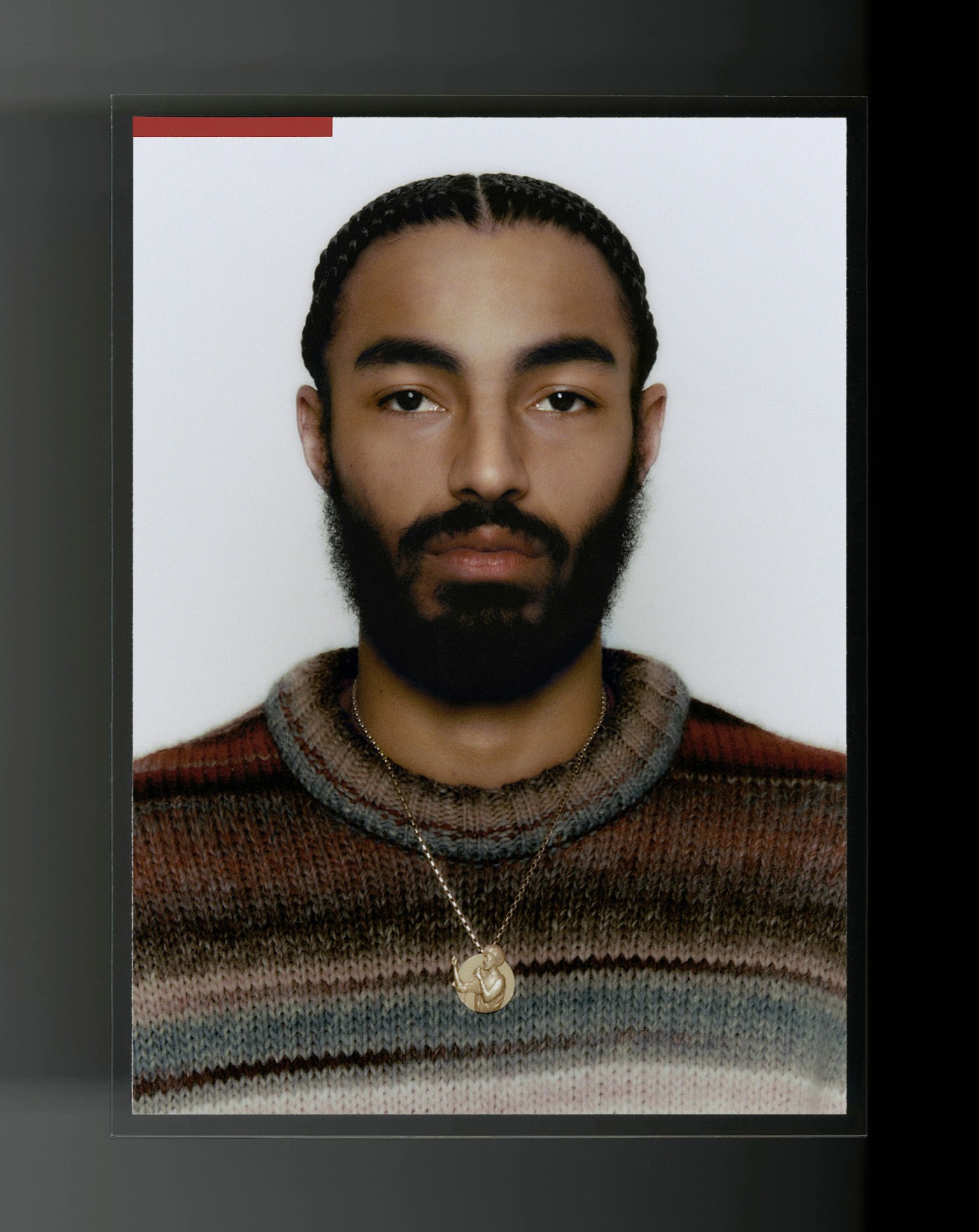Sage Gabriel Carlos Atreyu Elsesser’s library is a homage to his family lineage. This tribute catalogs the traditions that run through all facets of Sage’s output, be it language, sound or movement. The professional skateboarder and musician now surrenders the several lives he’s lived in the public eye, realizing what happened before is what matters most.
NR
Was there a point where reading began to bridge with your musical experience?
SE
A piece of literature that I fell in love with really early was The Giver01. It was the first book where I could see this whole world painted in my head. It's about a community where feelings are suppressed and there's one kid named Jonas who is given the gift of feeling for his entire generation. The first feeling he learns is pain [sunburn] and I remember vividly, this image of light––I was engulfed by that text. It was the first time I read sentences that had imagery. My music is the culmination of giving an image to sound. When I write and make my music, it does the same thing that The Giver did to me when I first read it.
But I think music is simply a vessel for all of my thoughts, because they correlate in one way or another and culminate in the presentation of my music. Versus writing an essay that has to have this structure to it.. Writing raps is always going to be therapeutic for me. When I write, aside from raps, I write about how I'm feeling in the present moment. But for some reason when I write raps, I can naturally sway between the past, the present, and the future in one stream of consciousness. One thought might trigger the next thought. I wrote something two days ago where I address different specific stages of my life––
Collins had the Cadillac,
Cherry paint and honest laughs, reminiscent of my past...
I remember everything...
papa sings,
white beads up on a string, white tee’s from down the street…
Me and big cuz.
I can honor those moments swiftly without writing a long essay about that time in my life––giving praise to those moments that would generally be forgotten. Those are the moments that shaped me into who I am.
NR
About the process of your writing itself being therapeutic. What stays written and is not to be spoken?
SE
A lot of things. That's what I love about literature; that you can reference something discreetly and all the imagery and thoughts can come into your head. You're paying homage without directly shining a light on it, and I love that about music specifically.
The beauty of poetry or rap is that it's coded. You can say things literally, or you can say them metaphorically. So, you know, people always generally say, oh, you rap like a stream of consciousness, which I agree with, because it is a stream of consciousness how it comes out. But I don't think I'm somebody whose every line just means a different thing, because I feel as though I open one door and that leads to the next thought, you know what I mean?
So, there's these kinds of misconceptions of what is considered coherent. Or what is considered structured writing. I don't generally write like, okay, I'm writing a 16. Unless somebody needs . I write until the thought is complete. Until I meet that one room––when I go through the door and there's not another door there.
NR
In Jonas’ [The Giver] journey, there's two qualities that stand out; pain and suppression. How do those manifest in your work?
SE
I think there's the human condition and the human obsession with . How we as a people have romanticized it. The way that I put that into my work is that I feel like I can speak for those who don't have the words to express what they're going through. That's why my music is mainly based on speaking to family and generational trauma. Because I know that there's people in the world that have been given certain traumas that they don't have an understanding of. And there's tons of trauma that I still don't quite understand.
Back to that idea of martyrdom, it's like, we're obsessed with it. This God complex, you know. It’s something that I've kind of had to surrender to. I can't play God. I do that in my everyday life. I try to control things that are absolutely out of my control. You fall in and out of love with people, you fall in and out of love with things you're passionate about. For me, that's painting and skateboarding. But I know that my music is somewhere where I put my creativity that will ultimately inform the way that I skate in the future, and how I'm going to paint.
NR
In creating your sound––from a process standpoint; is there a specific order to the three elements of seeing the image, music production, and the language? Maybe it changes all the time.
SE
I'm someone that thinks that the music is ultimately most important. Cause that really creates the atmosphere––you know, if the music is quite somber, then you're able to really go to that place.
NR
So you always start with the track?
SE
Right. And I love working with other people's beats because they might strike up a memory I may not have been able to tap into on my own. I appreciate that. Shedding my judgment to an extent. Working with other peoples beats allows me to put all of my energy into the writing process, opposed to some of that energy being invested into making the beat.
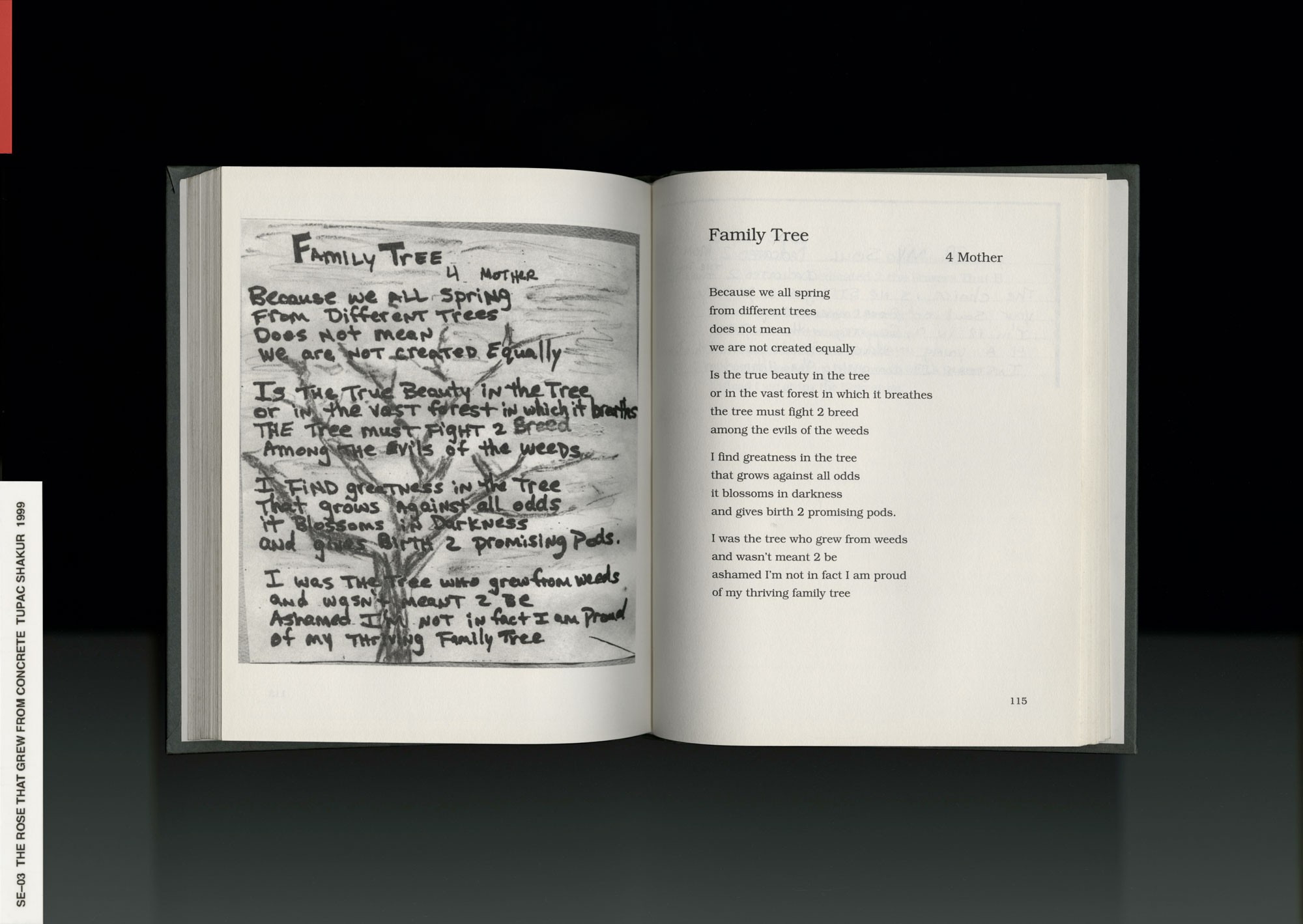
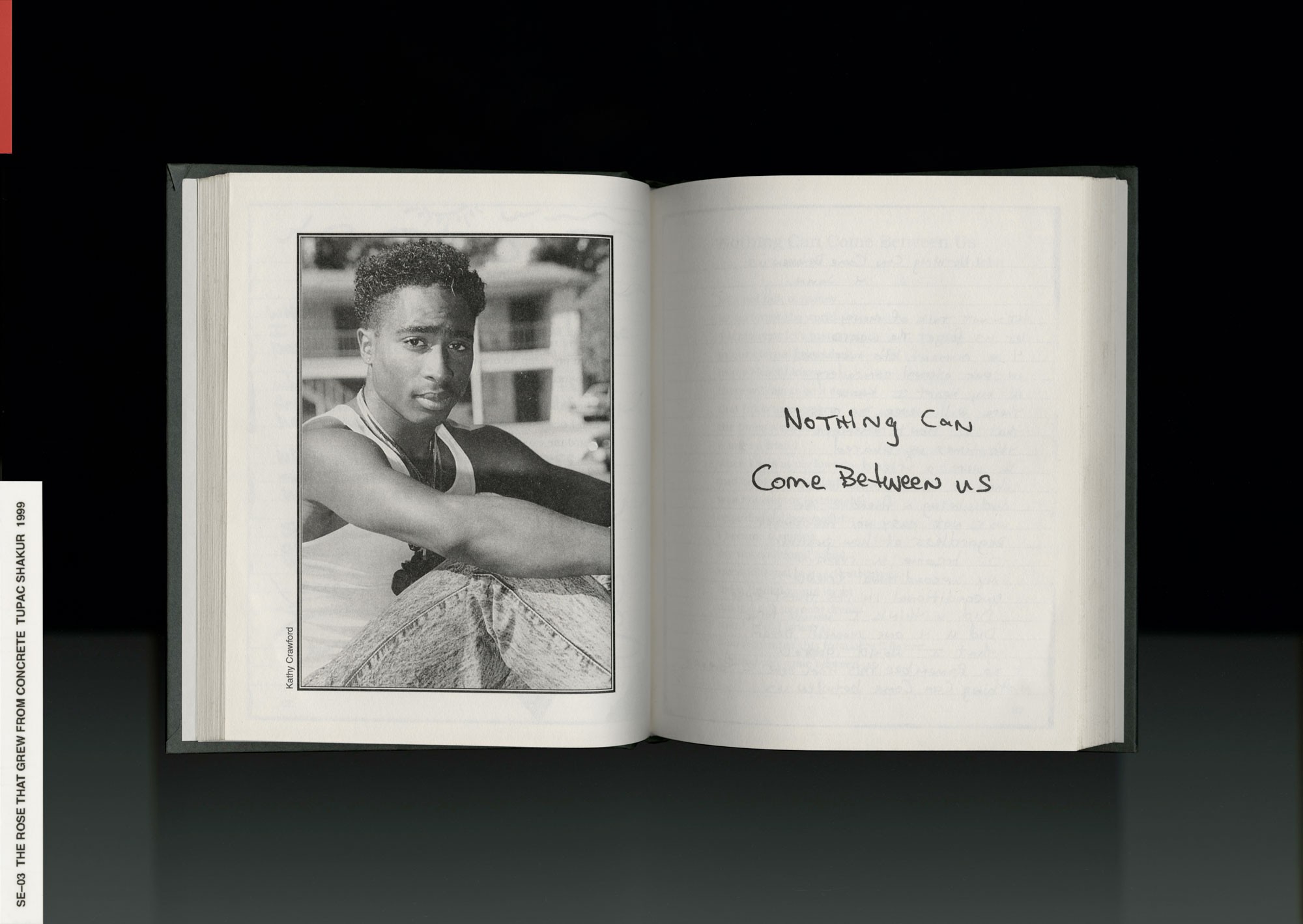
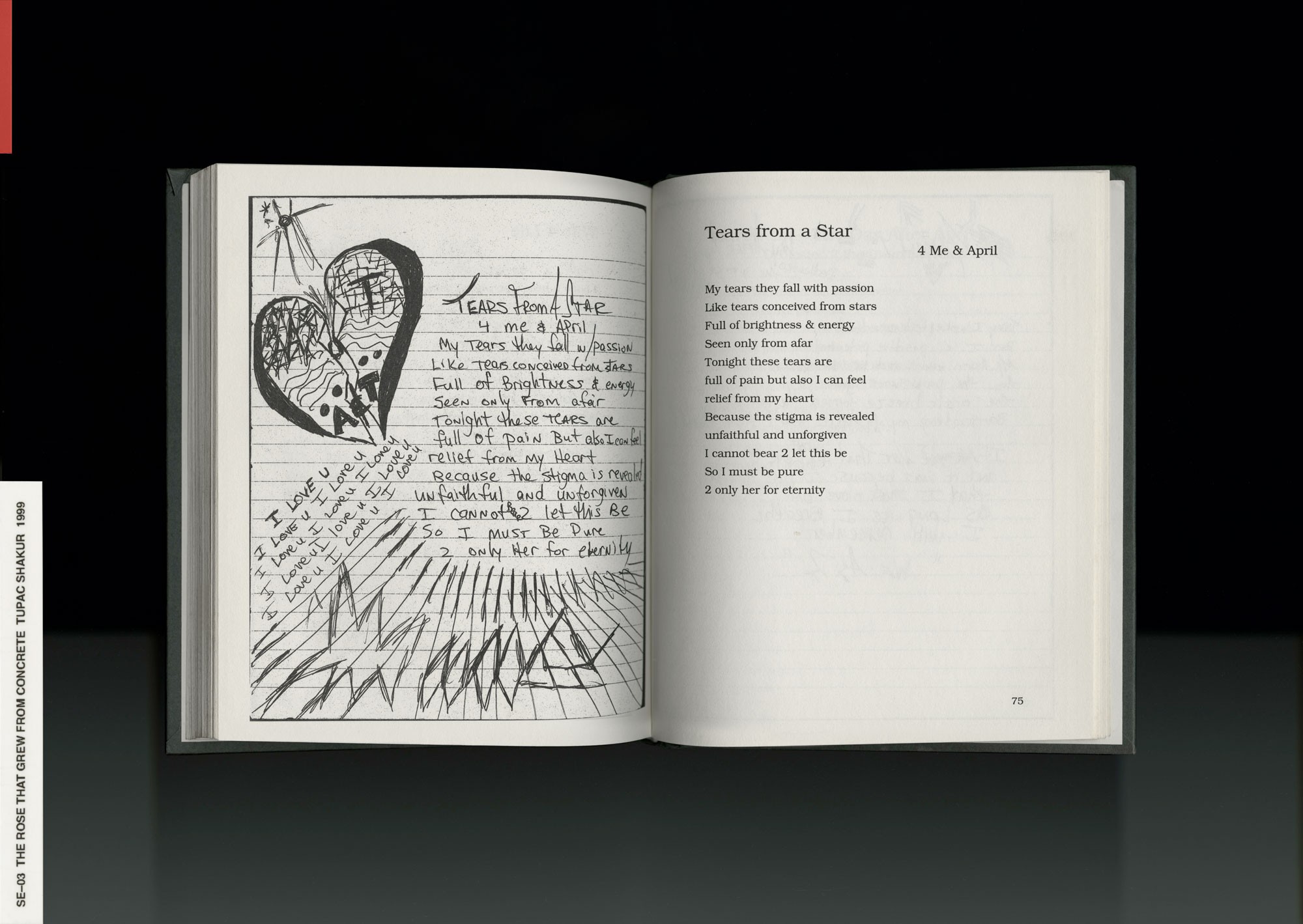
NR
And the language. Specifically down to the words, are there parts of your music that are influenced by books? Navy Blue has been in some ways identified with spoken word style.
SE
That always kind of bothers me to be honest. Because it's like saying, oh yeah that's like poetry isn't it? But all rap is poetry. All of it. And there are people that do spoken word. There's a lot of poets that made albums where they're speaking their poetry over music. Gil Scott02 was honestly like the first rapper. So I get it. I totally understand it. But being that I was born in 97, the music that I grew up with is rap. That's what made me want to use my words. was the first rapper I ever heard and I read his book of poems called The Rose That Grew from Concrete03. It's just rhymes. It felt a little different. It felt very intimate and personal too. It didn't seem like there were dollar signs attached to it, you know?
My parents were songwriters, so they encouraged me to write. And then my dad encouraged me to write raps. I still have my first raps written on paper. It's called ‘I see Angels’. I think I've just always written quite poetically, just naturally because my parents spoke poetically.
NR
Moving into your teen years in LA, what books or figures in general were you drawn towards?
SE
Growing up in LA I was incredibly influenced by the culture, everything about it, LA at that time was so important. Just being able to know that there were other skate kids, black, in LA. was a big influence for me growing up, just the way he dressed. He put me onto so much. How I tied my shoes, that came from Nak. I used to throw down my board ––Nak taught me how to throw down with my left hand versus my right hand, because I'm . I'm so grateful for , that era was golden. Fairfax had a big downfall––you know, an influx of streetwear culture and what not. There was a time when it was just us on that block. It was a really special time.
I wasn't a big magazine04 guy. Of course, early, early on, 411 tapes and stuff like that. But I come from a different generation. And at that time it was the —Pharrell was the man at that time, Ice Cream, Bape, all that shit. It was super powerful for us to see a team of predominantly black skaters on a different stage, doing something different. How many of us heard like, oh you're doing that white boy shit? So, when we're able to put our own flavor and spice on it, it made it what it is.
I'm so grateful for the people that showed me the right shit, everybody in my life. It all plays a central role in who I've become and who I'm becoming. One of those people was , who skated for Ice Cream, a white dude. And he showed me a bunch of old skate videos. The little, littlest things. Check this guy out. did the same for me. Watch this guy. Watch this guy. Study these videos. , another legendary skateboarder, kinda took me under his wing at a really young age and just showed me so much. I was a sponge.
And I know that a lot of us, being black and young and LA, we were all so close to one another, it was a world within arms reach. And we had each other and we loved art and music. And I felt like, in the same way that young people turn to gang culture to relate and have a family, or brotherhood–– was like that for us, but it was rooted in art and music and laughter. I was a little ass kid. And they always took care of me. was my best friend and still is to this day.
NR
How did that hivemind affect you creatively?
SE
I mean, I wanted to make beats because I heard , I grew up listening to him. Both my parents are musicians, so I always grew up hearing music. My father plays and is initiated into practice where he is an Omo Anya, which means he's sworn to the drum. I always had a very spiritual connection with music, I grew up listening to a lot of soul, and a lot of jazz. And then I asked my Dad for an . He got me this little thing called an ––tiny battery powered with preloaded drums and sounds on it–– and I used to make beats on that. Thebe and I used to take the bus to the boys and girls club in Santa Monica to make music. I would take that XR20 everywhere. I would just put it in my backpack. We would make music together way before Odd Future times. That really informed my sound and what I like––Alchemist, and anybody who worked on an MPC, really. I remember hearing and was like, what the fuck? This is insane.
I think just hearing the more music that was reminiscent of the music I grew up playing, the Afro Cuban music, was super comforting for me, to know that there was this music that wasn't far off from what I was playing. That informed my rhythm and I was able to incorporate stuff I had learned from my father into my music.
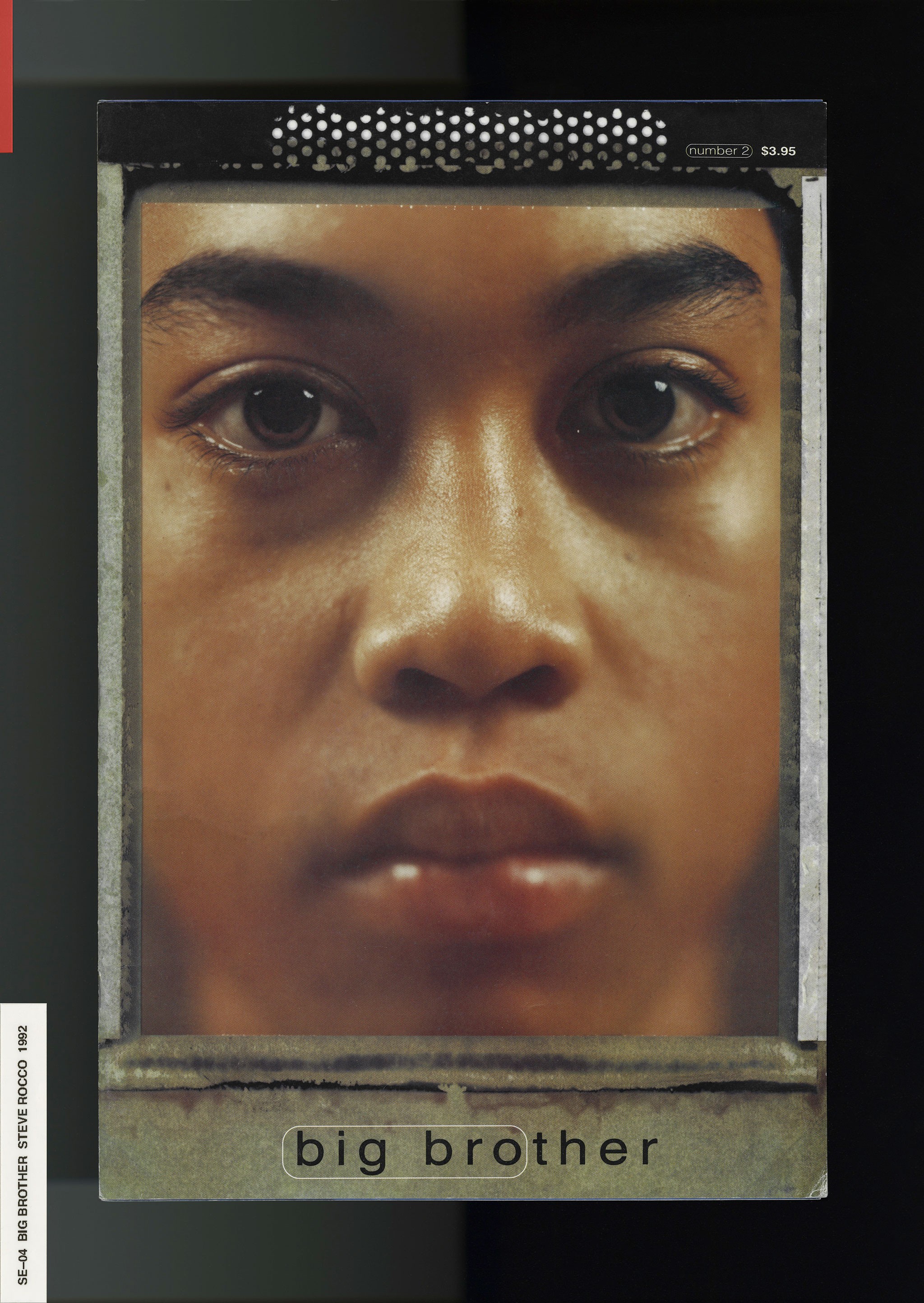
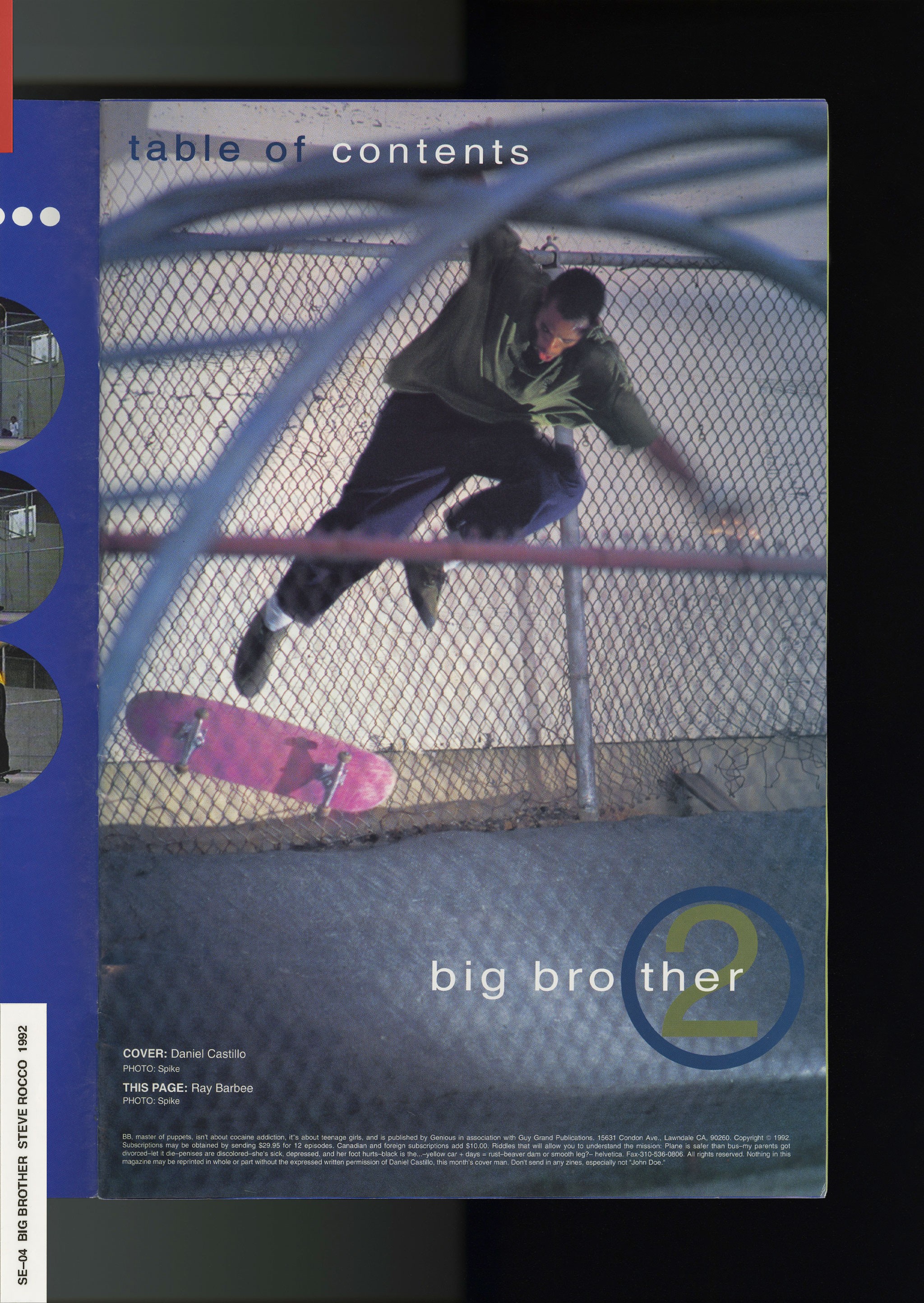
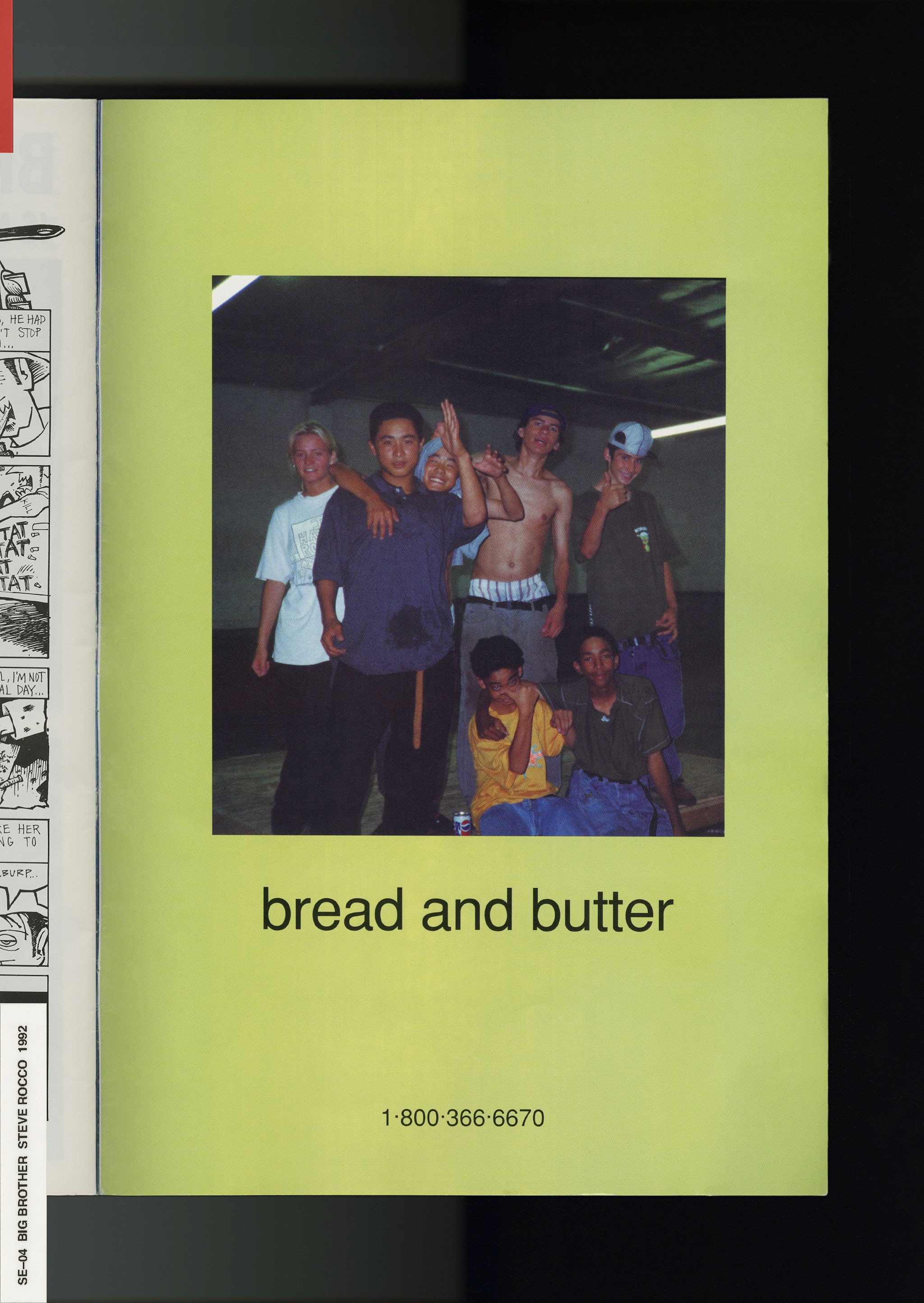
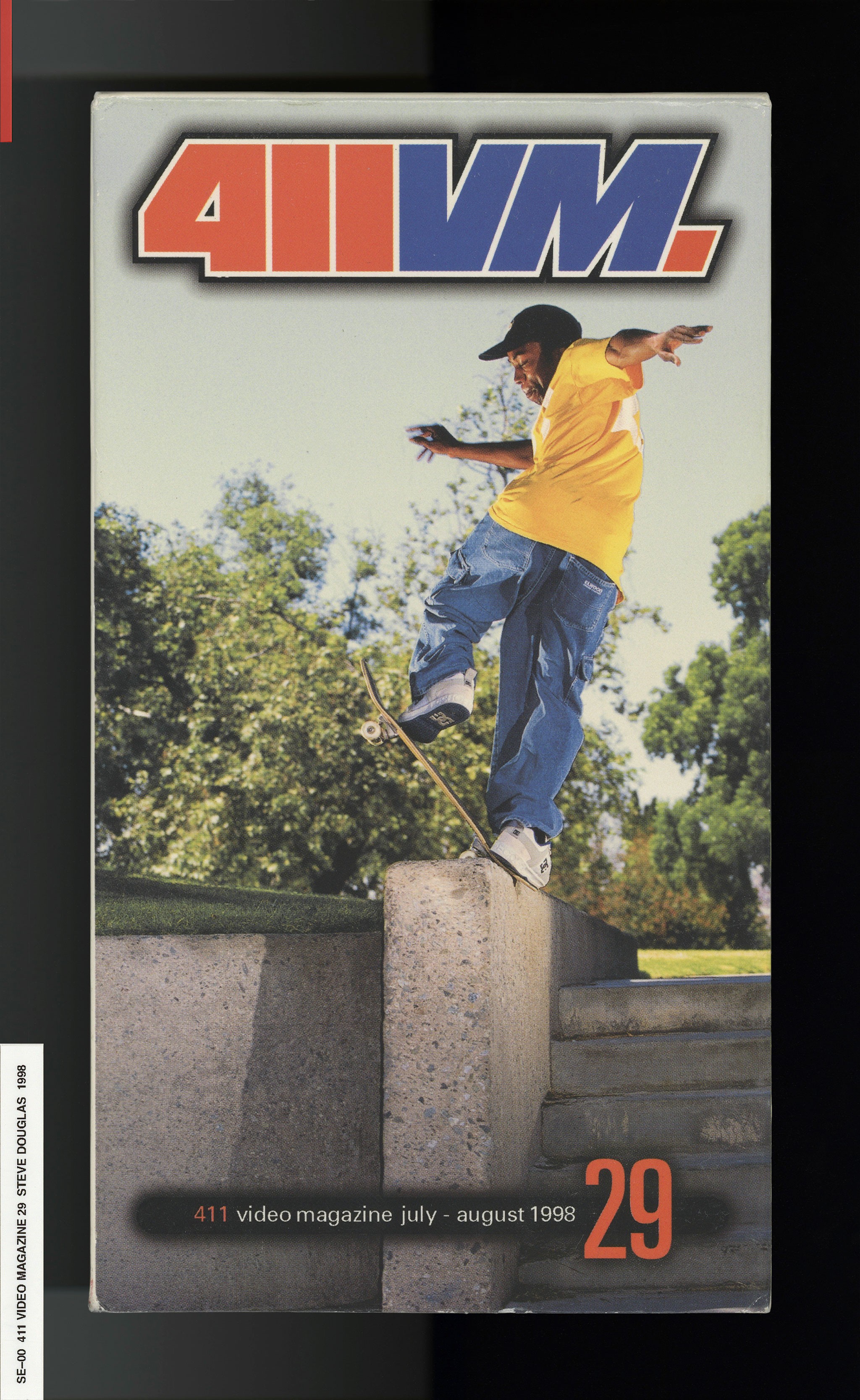
I went through so many different phases at that time just trying to figure it out. I had such a strong rage. Because even like—my honesty––I take a lot of it from when I listened to a lot of hardcore. Being able to express anger in a quite healthy way. I remember listening to when I was young. And looking deeper into punk and hardcore and was so engulfed by it, but I didn't have to turn that anger on myself, I had a place to put it. Rap music always did that for me, but it was so clear with hardcore. And then I fell in love with , and that shit really was like a tsunami that hit me.
NR
Learning drums and the rhythm from your dad—is that a core thing that reaches your different disciplines?
SE
Absolutely. Specifically what you're talking about with the music that my father taught me. A lot of the music we play isn't just traditional four/four. Which is 1/2/3/4. Or three/four which is 1/2/3 1/2/3. A lot of the rhythms are in 5/4 and 7/8. It was understanding that there's a structure to things, and there's a way to respect that structure whilst venturing out. A lot of people might say jazz is that way. When I approach anything that I do, the first thing I ask is not, okay, am I doing it the traditional way? It's generally, how do I make this feel good and honest to me?
Simply put, it’s about being really free. That’s what I love about skateboarding, it's a place where I can express myself with my body, entirely. I think that the first time I started to get comfortable with the expression of my skating was when I started getting flowed boards. I started to expand and understand where I was strong, and I didn't shine too strong of a light on my quote unquote weaknesses. To this day I might get a little insecure about my ability, but I’m like, let me just focus on what I do well and just try to bend the rules a little bit. Like they say, it's not what you do, but it's how you do it. Anybody can do the same trick, but does it feel good and look good?
There's a difference between whomever playing a note versus another musician playing a note and it just feels different because it's about what goes into it. That's what I've grown to realize, what comes out is honest expression. People are going to identify and relate if it comes from an honest place.
NR
During this late 2000s LA period you were surrounded by musicians who were creatively autonomous. Some went on to be highly commercial, whereas others still operate independently—primarily, all of whom remain uncompromised in their vision.
Currently, you are self publishing from Freedom Man Records. What advice do you have for the future generation based on your time in the field?
SE
I guess I just got to the point where I didn't want to rely on anyone else. I had to trust my process. And just be like, you know what, it's not hard to do this, you know? For me, I'm still working with the same shit I started with; a laptop, an MPC, an interface, and a shitty mic. You know what I mean? That's all you need. If your message gets across, your message gets across. It's all about intention. My intention is always to expound what's tangled up within me. And I think that making music is the process of untangling all that shit and letting it come out in a healthy way.
So, I know there's tons of kids out there––even if they're not making, you know, the music that they want to be making yet. It's still an important process. I've made tons of beats that I don't like. A lot of raps that I don't like. But it's a part of the process.. Nothing happens overnight. I have to remind myself that skateboarding has become second nature to me. I know I could just get on a board and balance, but it didn't just happen that easily. I had to fall over and over. And it took hours and hours and hours learning how to Ollie. That's why, whenever the young kids always ask me, what's your favorite trick? I always say . Because that's the foundation.
NR
Odd Future specifically, how did that inform the process?
SE
Particularly with , because he just had a vision like early, early on. He always wanted to do things hands-on. I'm going to make the beats, I'm going to make the clothes, I'm going to make the cover. It was all him, you know? I always identified with him because of that. It's not that it's like, oh, I want to be in control, but that's what he had. He had him. He made it work. And I think that's important. It’s really important to just trust in yourself, you know, we're humans and we can be insecure. But have faith in what you're passionate about. There’s always going to be people who don’t like it.
NR
Your debut album means Iron Cutlass. Deriving from the ancient story of , the God of War and Iron to West Africa's Yoruba peoples. How did this story relate to the approach of your project?
SE
During that project I was going through an internal battle. Ogun05 is a forest dweller, he's an isolator. He’s the god of iron and warfare––but he's also very flawed in a lot of senses. Ogun deals with a lot of shame and guilt. And in Ifa we call it a Pataki, which is a story, you know. And there's a Pataki about him acting in a rage, defending his village, and hurting the people of his village in the process. In result, he was so ashamed of what he had done that he went back to the forest and dug a hole and went in it, which stretched to the core of the earth. And said, if you need my help then you can pull this chain.
I love that about Ifa06. Because it really deals with the contents of character––what makes you a good person? And it's not overwhelming. You can change your life, you can be of service. And realistically, you can only give as much love as you have for yourself, really. So getting right with yourself is a service to everyone you love. It's all about keeping a cool head. That's what Ifa teaches.
But that album specifically is of utmost importance, because I was going through a really hard time. And the importance of the album title is, Àdá Irin, his tool, the iron cutlass, which as quoted here, is to “further clear the way”. The importance of that project is that Ogun is peaceful, but he's also the God of war. I had a lot of festering fear to confront.
It's particularly a reference to the internal battle that I was going through, but coming out the other side, you know, at peace... We naturally isolate ourselves when we feel uncomfortable. But there’s a difference between isolating and separating. You can separate yourself for the betterment of yourself and others. If I'm not in a good mental state I might then do something that'll hurt someone else. I'm not isolating to metaphorically dig a deeper hole to run away––what I'm saying is, isolation can be harmful, but also be very beneficial.
Àdá Irin addressed what I was going through and that was really the reason that I dropped the second album before the year ended, because I wanted to close the year off on the right note. That's why that one's called . It's the calm after the storm. There's always been points of peace, but there was a lot of abuse, like smoking a lot of weed and I kinda started to realize it wasn't for me. The reason that I was smoking was just to find peace, but I found a more beneficial way to find peace versus something self-destructive.
NR
How the Ifa has flaws, it’s a lesson but is also relatable. Are there any key contemporary people that kind of serve that role for you?
SE
Gil. He was a complex being. He was an addict, and had a lot of grief and trauma that he was dealing with. But he still was influential, you know? And he knew that there was something greater than him. Or, at least I think he was serving a greater good. And I think that's a theme with a lot of musicians and artists. is one of them. He made the world laugh, but he was sad inside.
I really fell in love with when I was 13. When I was about 16, I started to delve into his literature07. I've been trying to collect them again, it’s hard. I found this book, Small Talk at 125th and Lenox, in Manhattan for 1200 bucks and the cover was ripped in half. And I found this one here for like 700 on eBay. I gifted one to a friend and then I had to have a personal copy. There's poems in this book that have changed my life. There's one called Soul that is just incredible. "Soul is the undefinable, inexplicable epitome of blackness”. I always reference that poem.
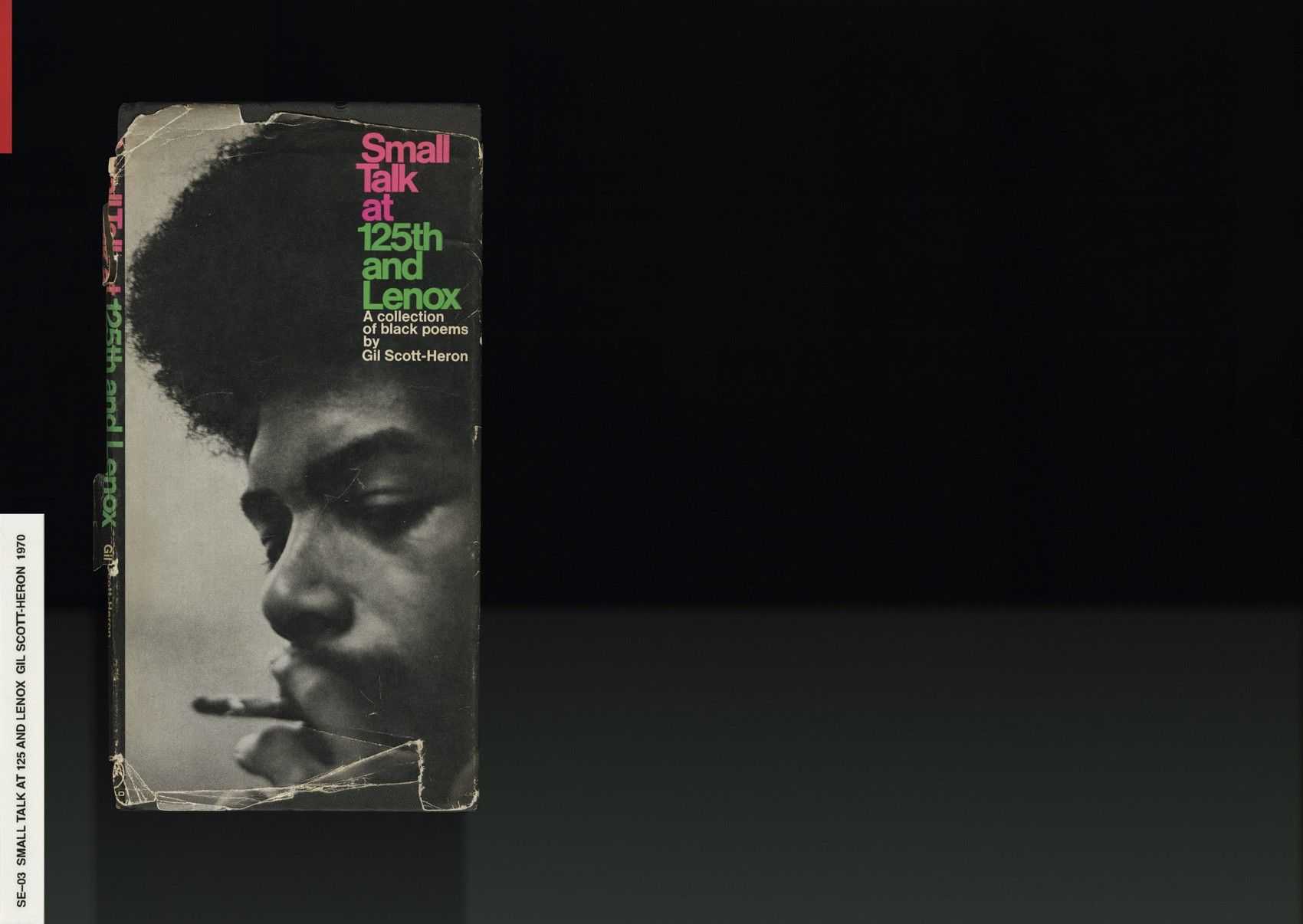
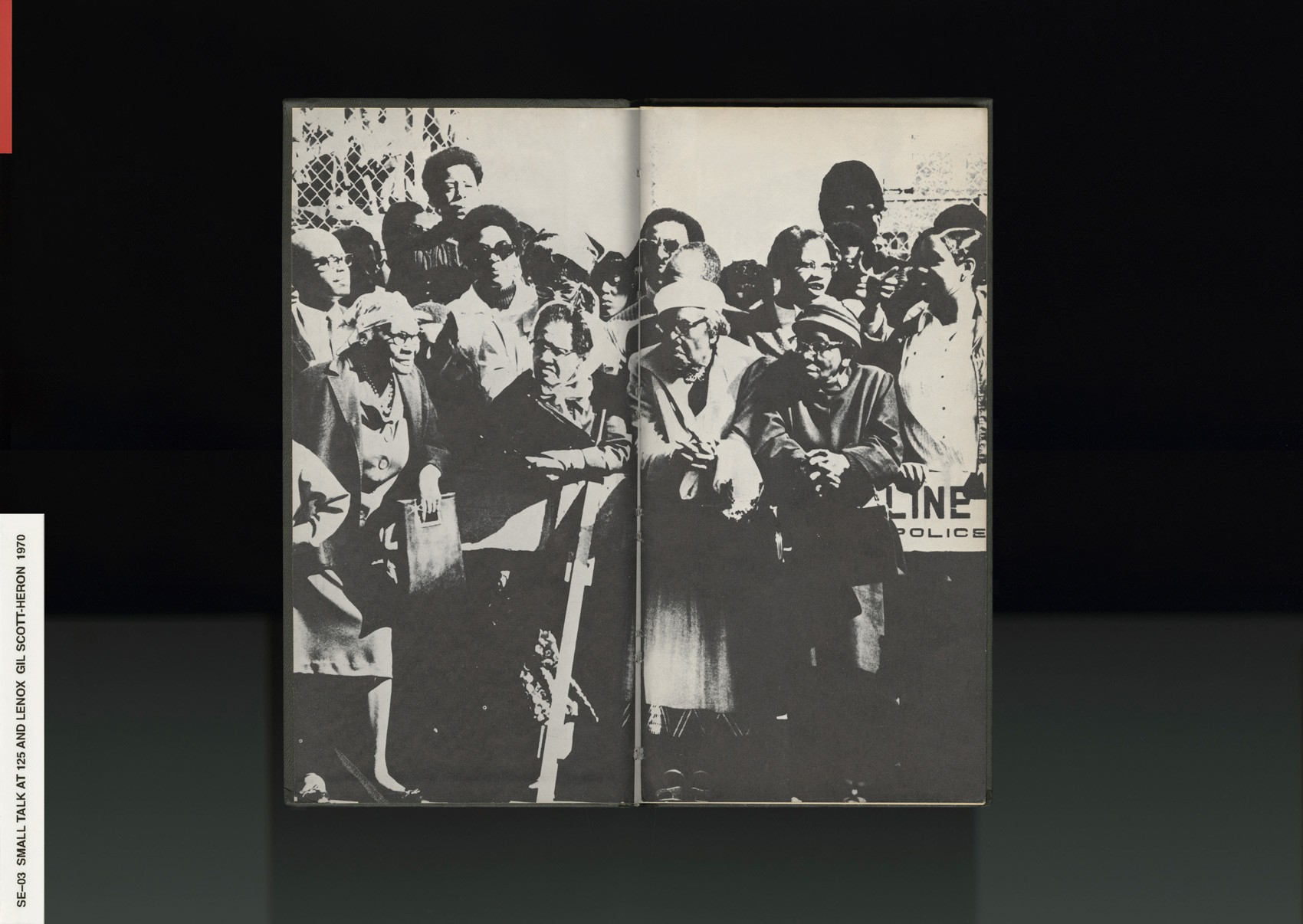
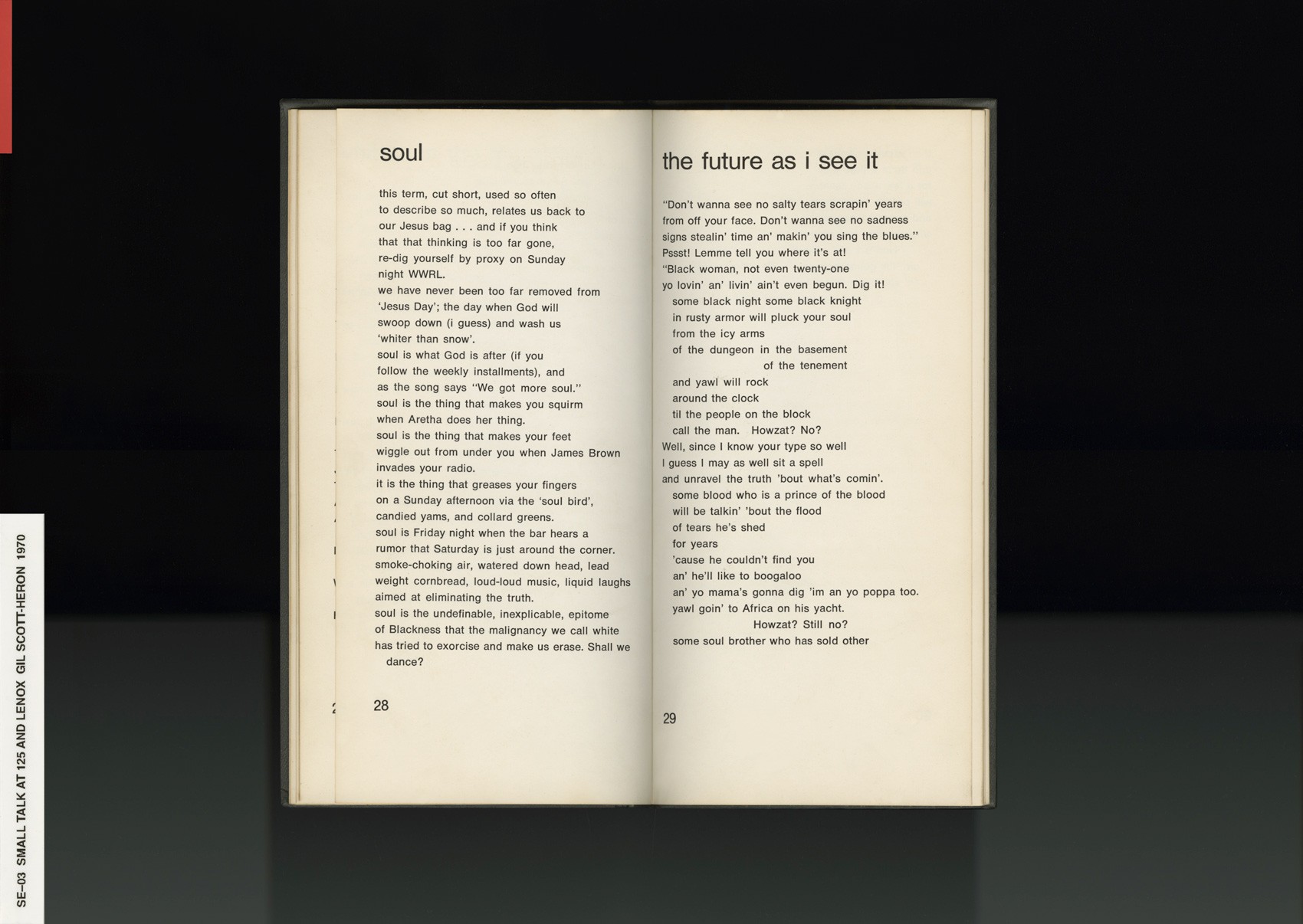
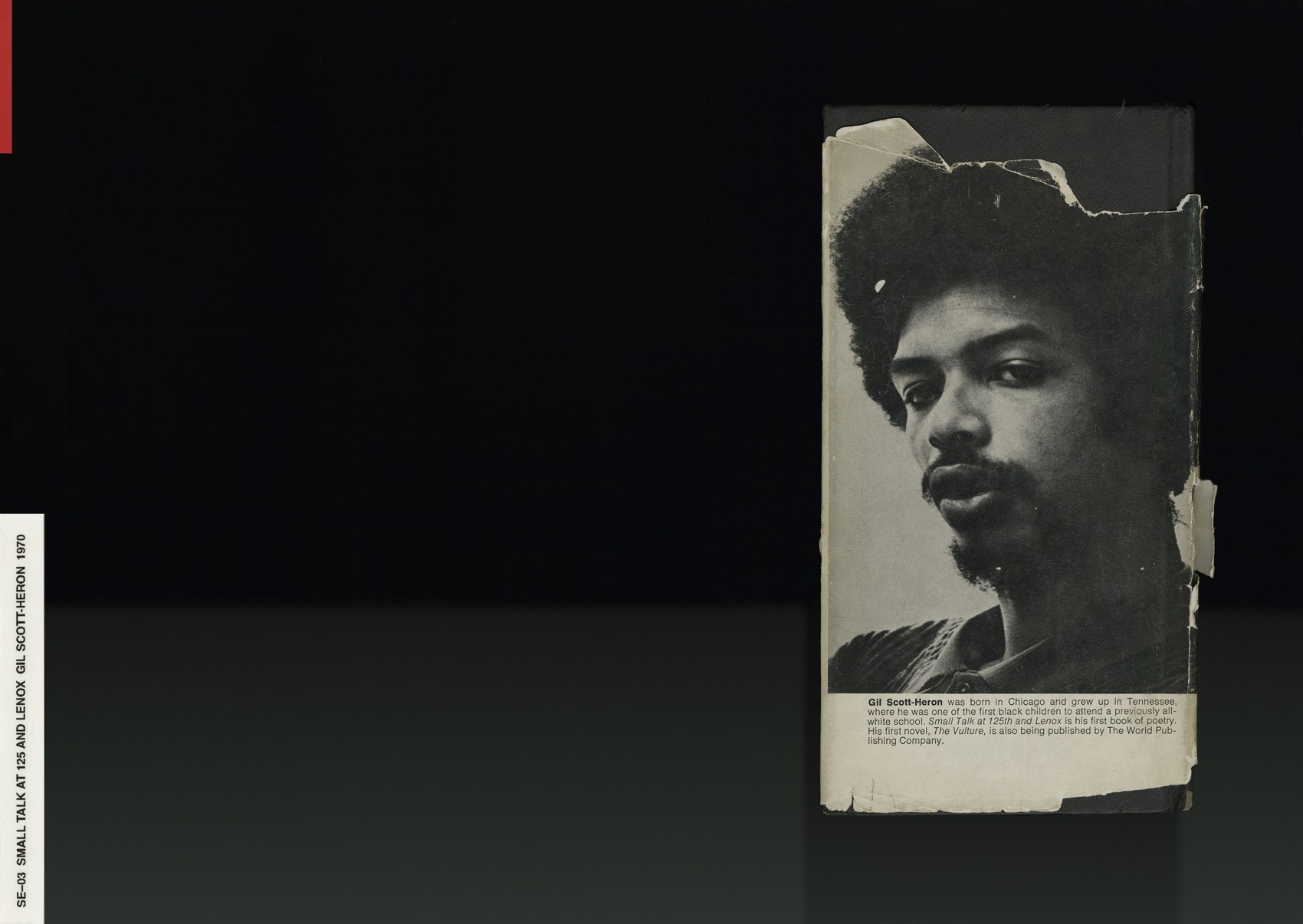
I just think things just hit different when .. And I know I keep saying it, but when you can identify with something, sometimes it's inexplicable. Even if it's a sound, you're just like this makes me feel .. there's something here that speaks to me. That's what I love about the spiritual practices. That it's very about you. You know, it's about you. It's not pointing fingers at other people––It's deals with compassion. Being compassionate. Being mindful. How to maneuver through the world peacefully.
My grandfather was also that person for me. Because as much as I put him on this pedestal like he was a perfect being, he wasn't. He wasn't, you know, we're all flawed to an extent. But it's when you are able to embrace those flaws that you're able to actually grow. I used to say all the time, that's not me, that’s not me. And someone who I love dearly used to tell me; until you accept that part of you which you neglect you won't won't be getting anywhere. That's always going to be the anchor. That's what won't allow you to move forward. Until I can embrace all of me, and not, you know, this idea of perfection, I will be continuing the perpetual cycle of operating out of sheer willpower.. I'm super grateful for this new found understanding of progress and not perfection. I learned that recently within the past year. And that was such a relief when I heard that. My whole life I've been trying to be perfect. And that's just not realistic.
NR
What other historical symbols are prevalent in your work?
SE
My uncle gave me this book, 1491: New Revelations of the Americas before Columbus08. In my own time, I had started to take a lot of pride in having indigenous heritage and blood. That's something that a lot of black Americans don't realize is that, as black Americans, we identify as being African, but what makes us American? My grandfather's grandfather was , my mother has his ring, and it’s crazy seeing images of him because you can see why black Americans do look different than a lot of Africans. See how that man looks super native? Of course, there's super similar facial features and how we're built, physically. But it's understanding that there's a big connection. And I say that on the album, on the song called Back to Basics––
Fighting what I'm feeling, physical, I'm back to basics.
Back to back with parallelled universe and spaces.
The land of it’s native Indian, who share the faces,
Mated with those who made it off the slave ship.
This book talks a lot about the advancements that the native people were making before the arrival of Columbus. Natives were at war with other tribes, but not in the ways they were given disease from the settlers. Like, sexually transmitted disease––Gonorrhea came from white men fucking sheep on the ships and then raping the women. That's a form of warfare in itself, and that's how the Mayans were taken out. They weren't necessarily beaten by the conquistadors––but slowly killed off09 by way of a deadly disease. There's still an overwhelming presence of the fuckery that we're dealing with. Post-Columbus, you know what I mean? You see it in modern day in certain communities with Covid, it's much harder for people without the resources and proper healthcare.
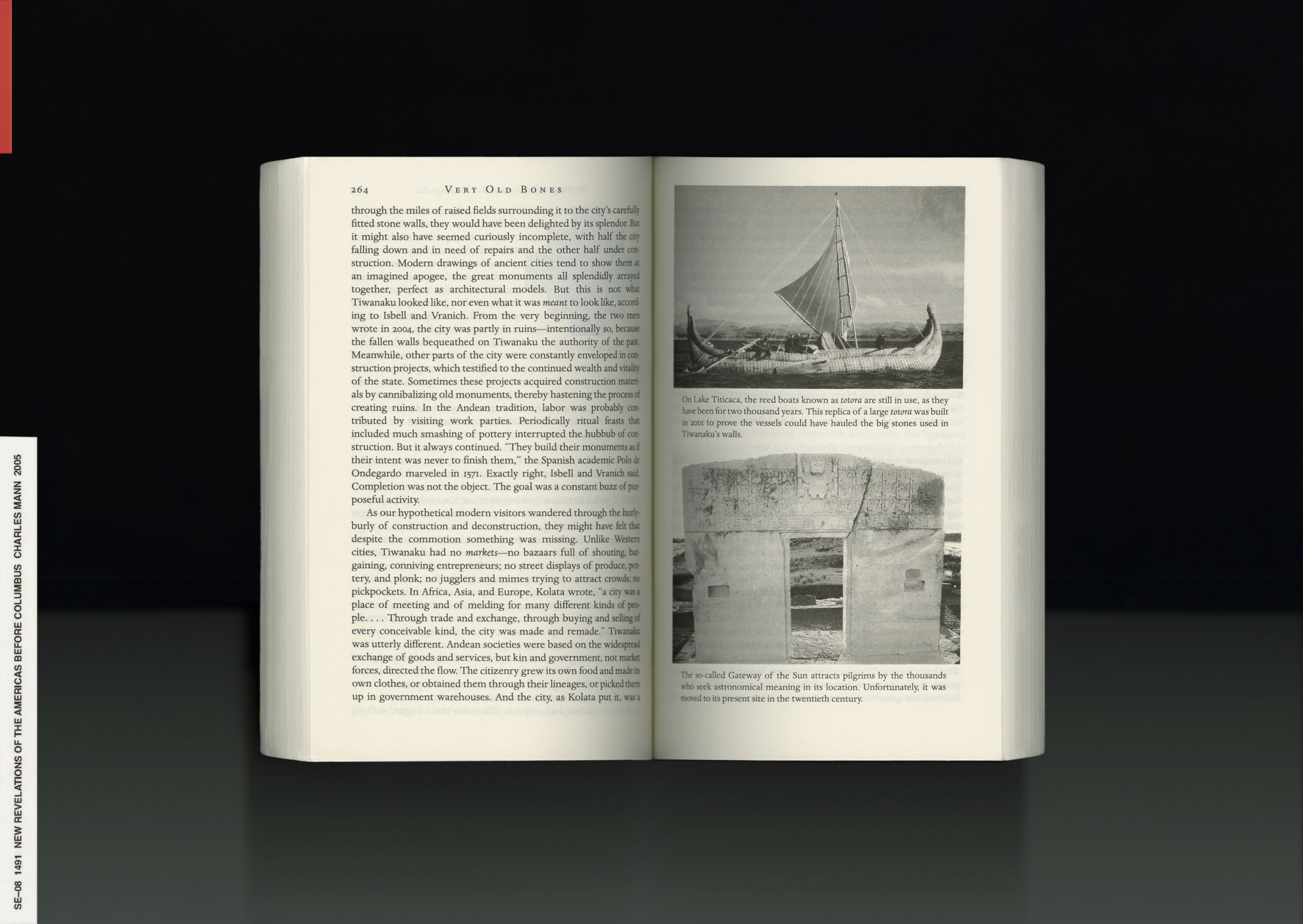
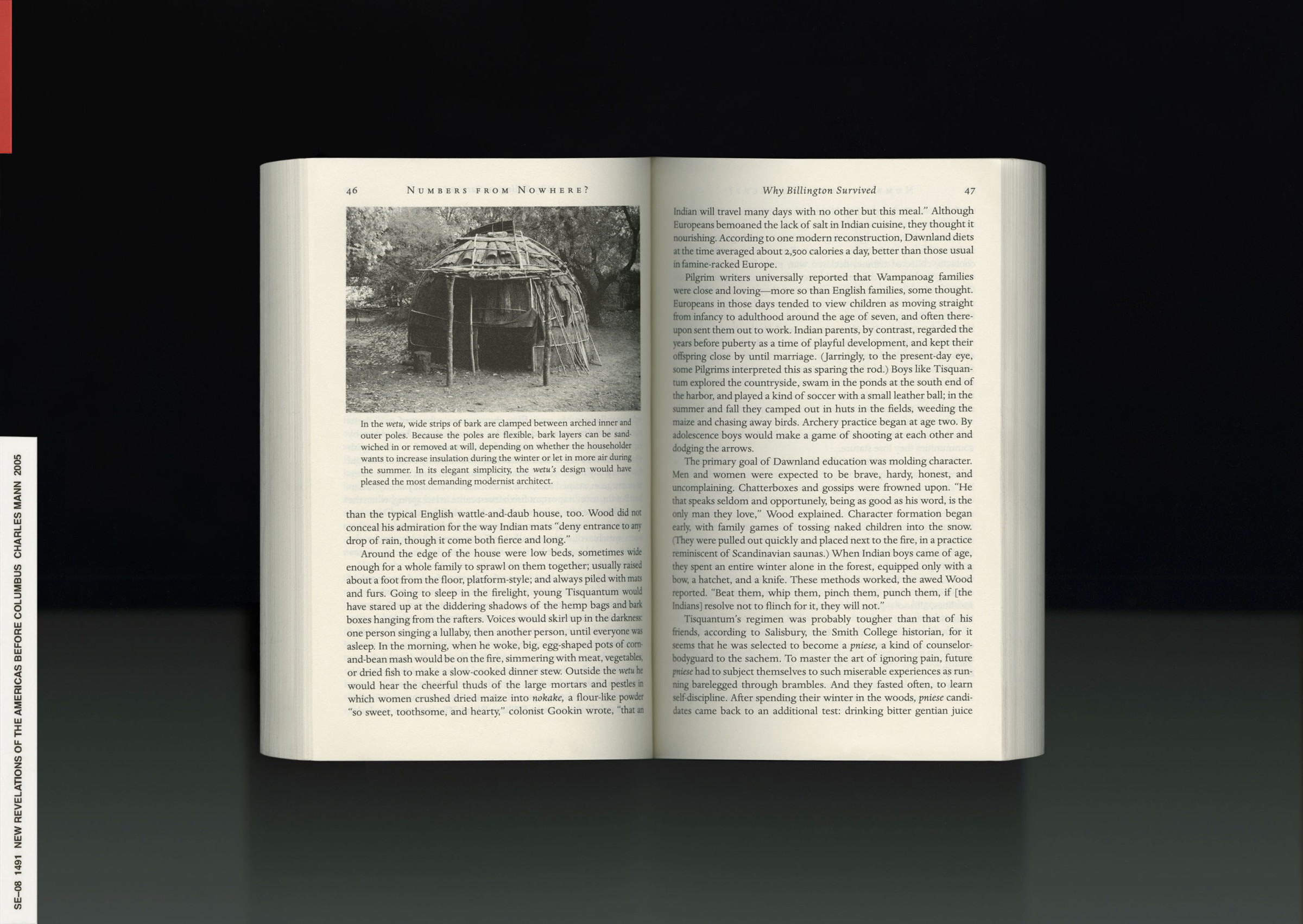
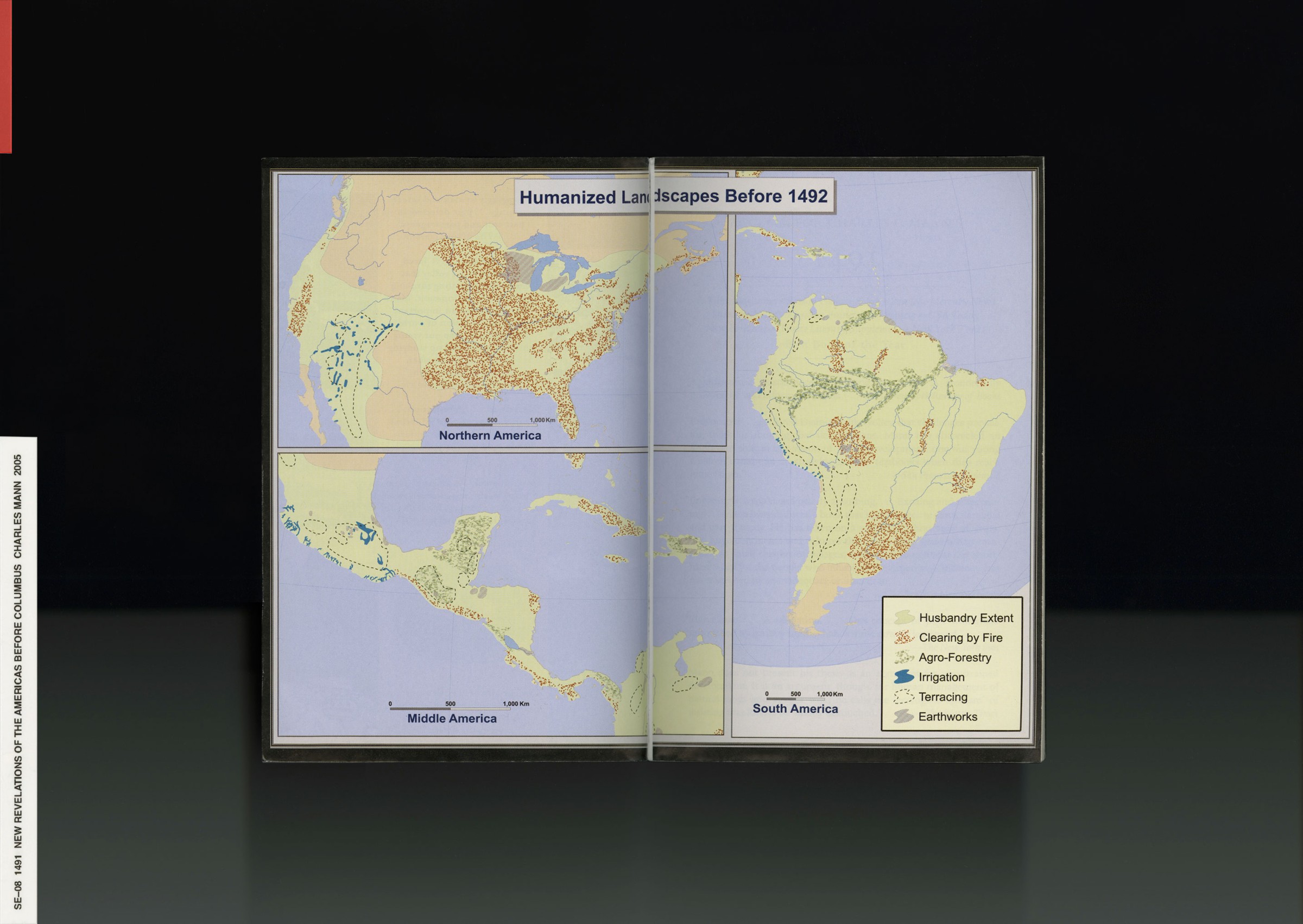
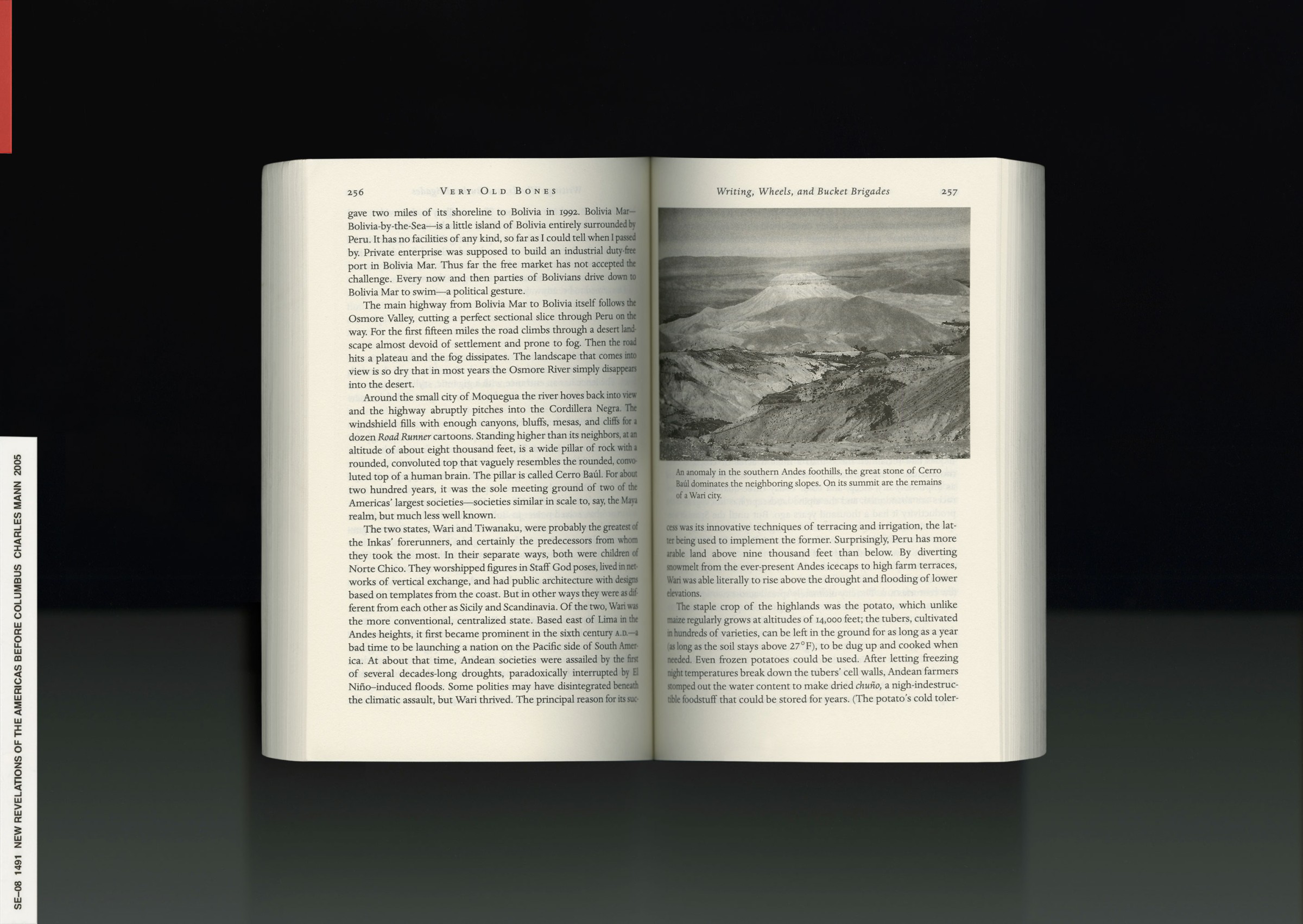
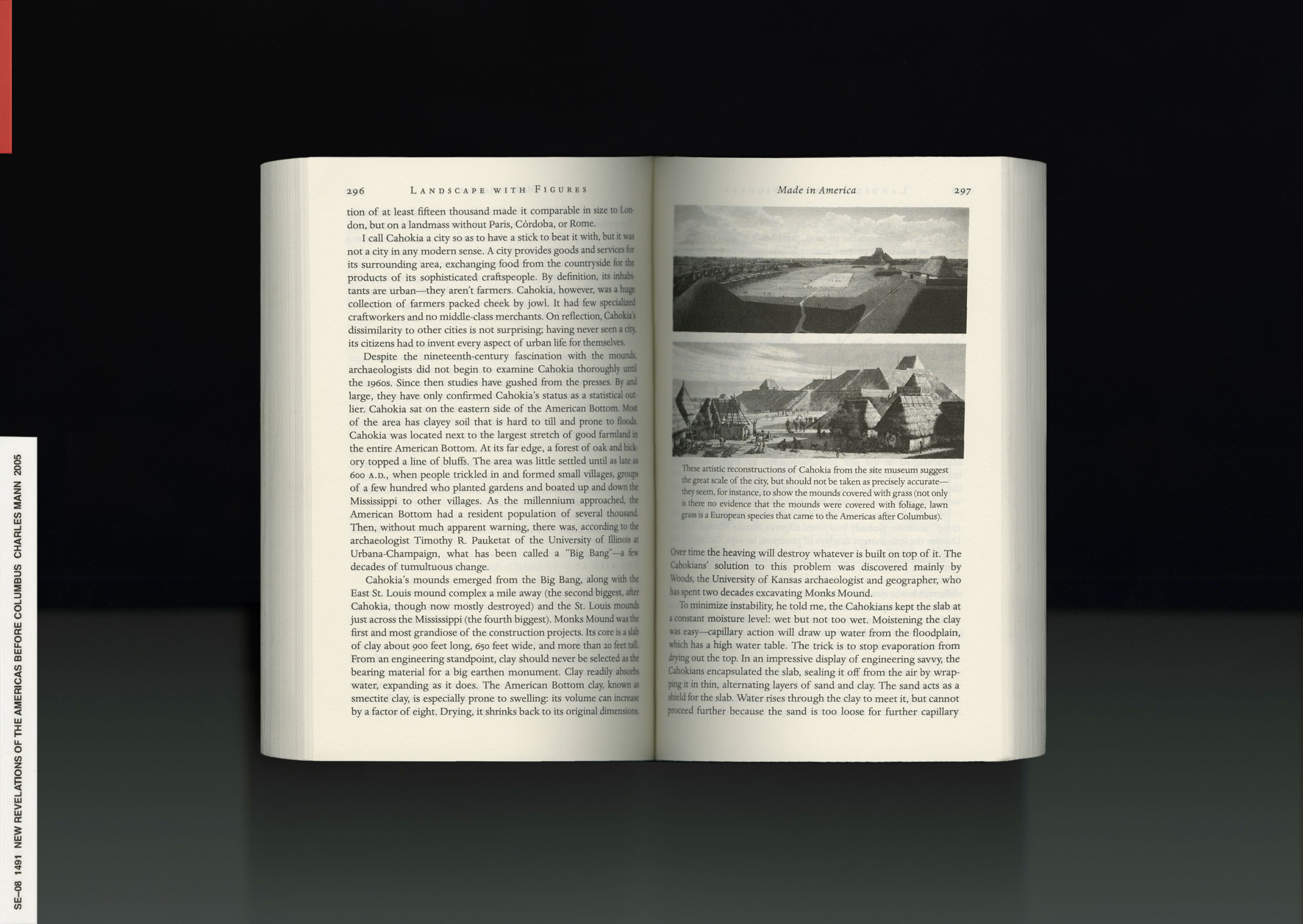
NR
Navy Blue began as an anonymous project, do you still wish it was that way?
SE
Well, because I have a certain following as a skateboarder, I didn't want that to influence the listener. I just want them to get it. Receive it with an open heart and open ears, as opposed to being like, oh this is Sage, the skater. It’s also a form of insecurity. I didn't want to own it quite yet. And then when came out, which was one of the singles for Earl's album , the cover art for the single was a photo of me and him. That was kind of the introduction to the person who is .
But it was really freeing to finally just be able to take a deep breath and be like, okay, let’s do this. Acceptance has been a huge part of last year going into this new year. Acceptance––really surrendering to the universe. I can’t control it. The rest of it is up to God, or whomever you choose to call it. That's been the greatest reward, acceptance.
NR
You mentioned not erasing lines when you write raps.
SE
Well, yeah, that's not entirely true. I mean, for Post Panic, yeah. As for Àdá Irin, I'd write something and just erase the whole line. And with Post Panic, it was just what I wrote. As I'm getting older and maturing, I'm realizing, there's no coincidence. It's all meant to be.
I thought about the word, "Alright." "How are you doing?" "Well, I'm alright." With one L. But what that's saying is I'm all right. Like A-L-L space, Right. It's all right. It's all meant to be. So I'll write something and be like, oh, I don't even really like that. But I love that. That's the thing about improvising, you might play something––an off note, and you're like, ah, shit. But that's what makes , Monk. When he plays piano, it's not Mozart. But it's of a similar importance. I'm listening to more Monk than I'm listening to Mozart, that's for sure.
NR
As a maker of music, skateboarder, and visual artist—someone who understands techniques of different processes. For example, when you are trying to achieve a certain feeling in music you understand the production mechanics required to the detail to get that sound.
Could you speak to how deconstructing different disciplines has informed your perspective?
SE
I've just kind of come to accept that whatever medium I'm choosing to express myself, it ultimately all ties together. It's all serving the same purpose. I generally honor the same people and feelings in everything I do, not separating any of it. It all comes from the same source. And to keep it a buck, when I stopped skating for a bit, and I was focusing on the music, it made me approach skating differently, allowing other interests of mine to inform others. Again, that's surrendering and understanding that it's out of my control and what's going to be presented to me will be presented to me. As different as they are, my skating informs my music making, music making informs my visual art and all my ideas.
Sometimes I get a little overwhelmed with how many interests I have. So much that I would like to do, but you know, it's one thing at a time. I've been so unhurried. Last year I had plans of dropping so much music and I'm glad I just let people resonate and kind of take their time with the first project. Because, had I overwhelmed people with too much, it would have taken away from the presentation of this recent project [Post Panic]. It's hard because I'm thinking, Damn, it's going to be hard to make a better project than that. But that's not what it's about. It's just what feels natural.
That's been where I've been trying to stay. Allowing things to inform me that I would generally be kind of blocked off to. Lately it's been just being more empathetic and understanding. Working with what I have is everything. That's what makes art, art, I guess. As you see people working with whatever material they have.
How do I say it? Im trying to allow myself to not be confined, or stuck on stupid, or limiting my blessings. I guess that's what gratitude is––shining a light on what you have versus what you don't. It's important to have fear. To an extent people think about fear like it's this super daunting Grim Reaper caricature. But approach that fear with confidence and allow that to inform your life. Because I was afraid of change, but that's been the most freeing aspect of growing up––is just to not limit myself. Let the cup overflow, if it needs to. You're going to lose important stuff when that cup overflows. But what's being put back into that cup might not have been there before.
NR
These in between spaces—the reader and then they become a writer. Or writing music, and learning to deliver it. Really doing it. You studied painting at , how did your technique evolve once you dedicated more time to the practice? Are there qualities that became less important than you imagined and vice versa.
SE
I think school fucked that up for me. Cause like, there was something really pure about the way that I was doing it before. There's a reason why I haven't painted since that experience. But just like, you know, the box. The saying think outside of the box. There's a reason they say that, think outside of the box. School is the box.
You know, It’s important. I guess the box is like learning to walk before you run. Learning the basics. But I just haven't found the spark since. It’s just not there. I hope to be inspired soon.
NR
Do you remember the moment you really stopped?
SE
Yeah. When I got to art school. Like, right away.
NR
In this stack, what else would be important to touch on?
SE
This Bruce Lee10 book is actually one of my first physical books––I was obsessed with Bruce Wayne, Batman, at a young age. My dad tells me stories about how I wouldn't go anywhere without this cape that I had from a Batman costume. And that's one thing with my father––he is someone that didn't allow me to get engulfed by fantasy. My dad told me, hey, you know Batman is a fictional superhero. I'll show you the real deal. That’s when he showed me . I wanted to get my hair cut like Bruce. I used to go to Chinatown and buy the little black suit with the slippers. I even drew one of my first drawings on top of this book––When you see it in the light, you can see all the scratches from the pen.
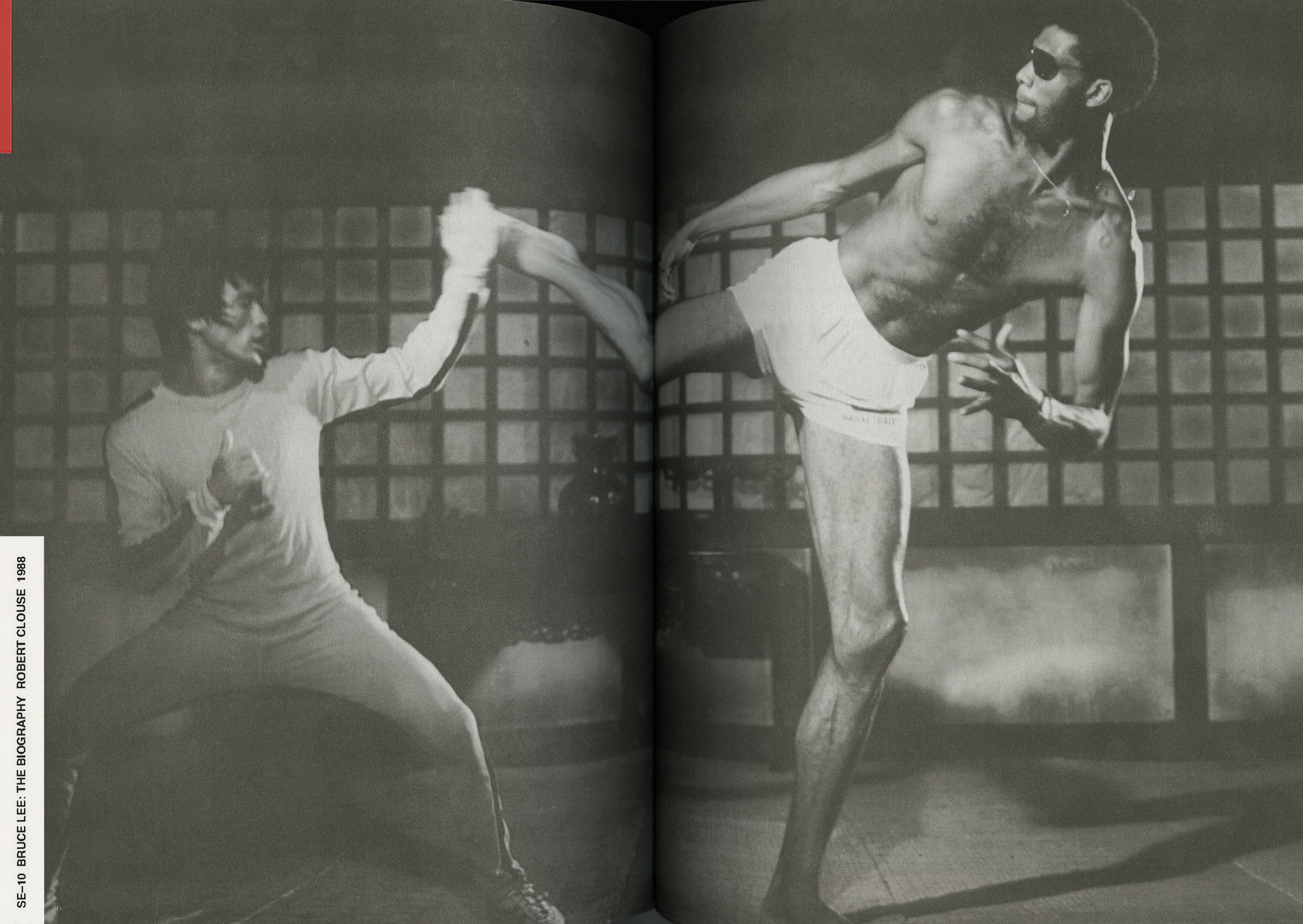
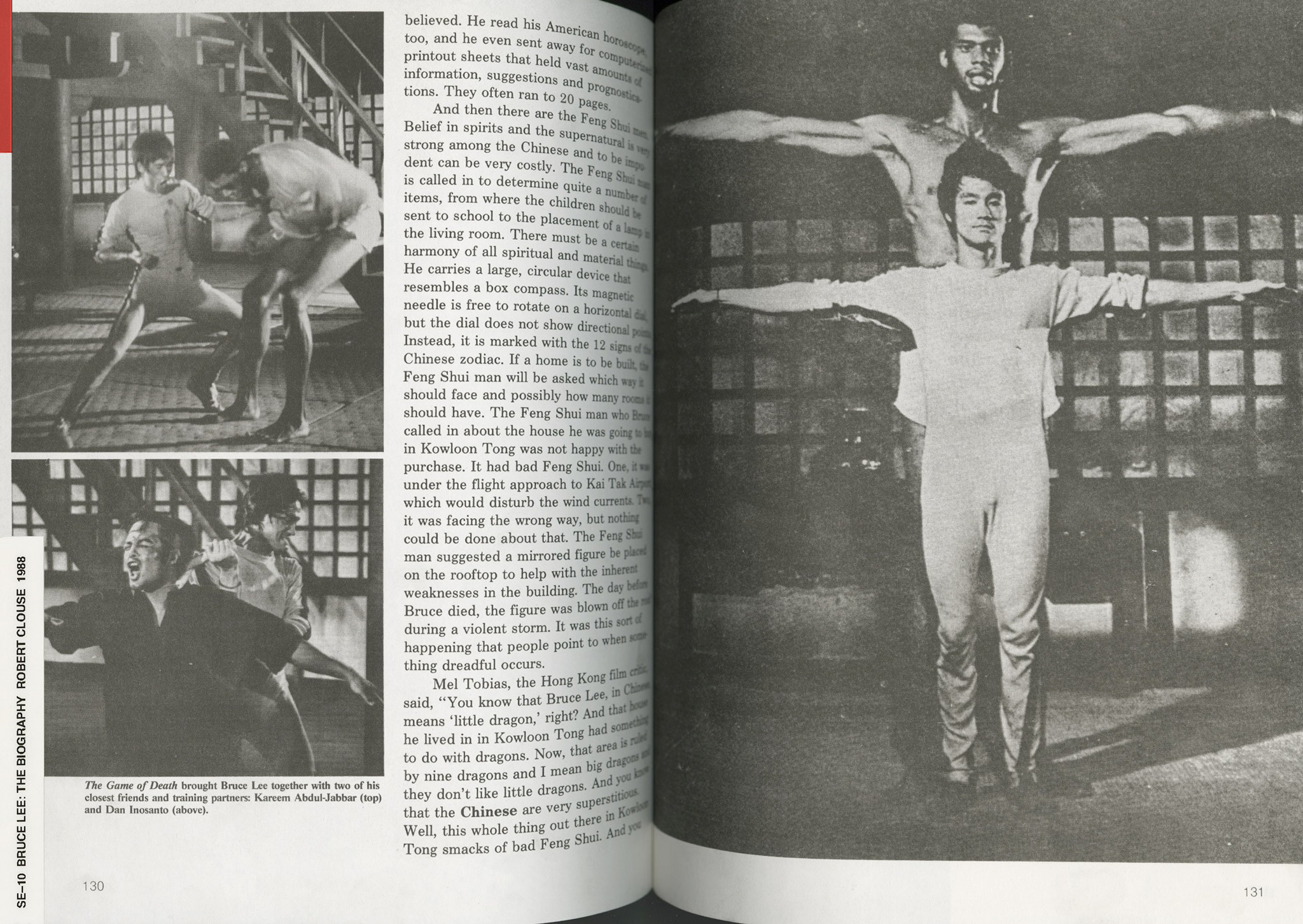
There's an image of Bruce and Kareem that I love. Here it is. Man, I'm grateful that I was exposed to him... to have someone like that as one of my heroes at such a young age, priceless. It really informed my spirituality as well, I started to do Kung Fu. There were always quotes that I took away from his films – the infamous one, which is, "Don't think. Feel."
And that's my boy, . I love that book11. You can feel the experience through his work. You can feel the intimacy in all of his images. Which is incredible to me. There’s a lot of family––I think this was when he was in Senegal. And This MLK book12 is great, I've opened this almost every day and just read one poem, like this; “In whatever, there can be no deep disappointment, but there is not deep love.” The Last of the Nuba13, my mom gave me that book. It's a really special book. Seeing images of black people in a different light, living in Africa at peace and not images of struggle. And The Prophet14, my mother had this book around the house, it’s really important. I read it in pieces. What I was first drawn to was the images. The author is also an artist, so he did corresponding paintings with each poem or chapter. The first one's called On Love and the image that goes with it is pretty incredible.
NR
What's the most impressionable library you've been to?
SE
My dad's books. It just told his story. There was always a book next to his little station where he sits in his crib. It was always just like a range of books. Ahhh, most impressionable? , It was next to Urth Cafe in LA, it was a very special bookstore. It specialized in world religions, wisdom traditions, physics, psychology, philosophy and health. It was founded in 1970 and according to Buddhist tradition, the Bodhi tree was the tree under which Siddartha15 sat in meditation until he attained enlightenment to become a Buddha.
They had the books that weren't in your regular bookstore. That place was special, just the energy in there, the covers of the books––I could just see how much my pops loved that place. How much he felt like home. He'd always leave with something. Always spiritual texts and the things that were, you know, secretive. Knowledge that isn't easily accessible or even widely accepted. Books for a very specific kind of person. My dad is very open to learning.
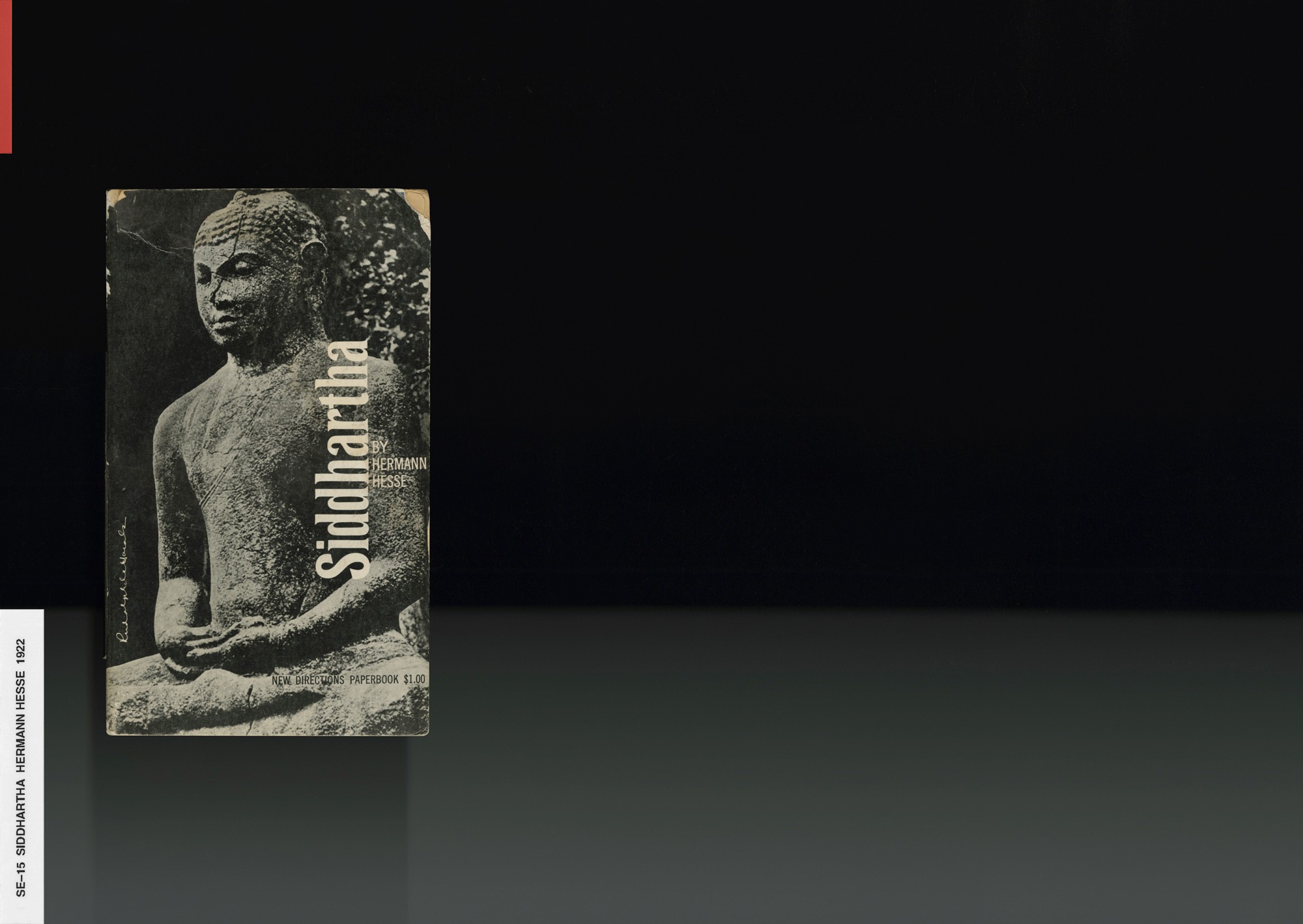
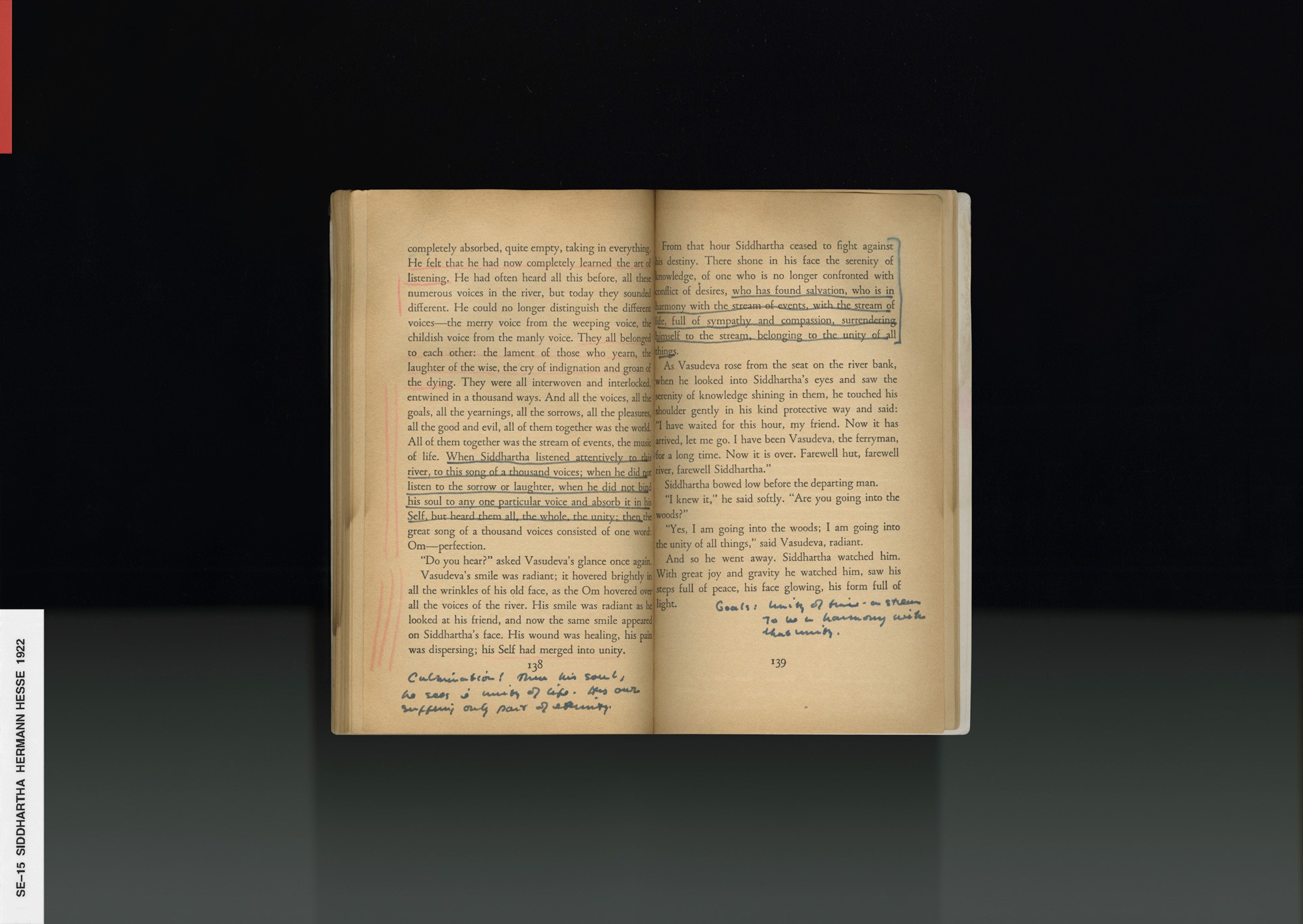
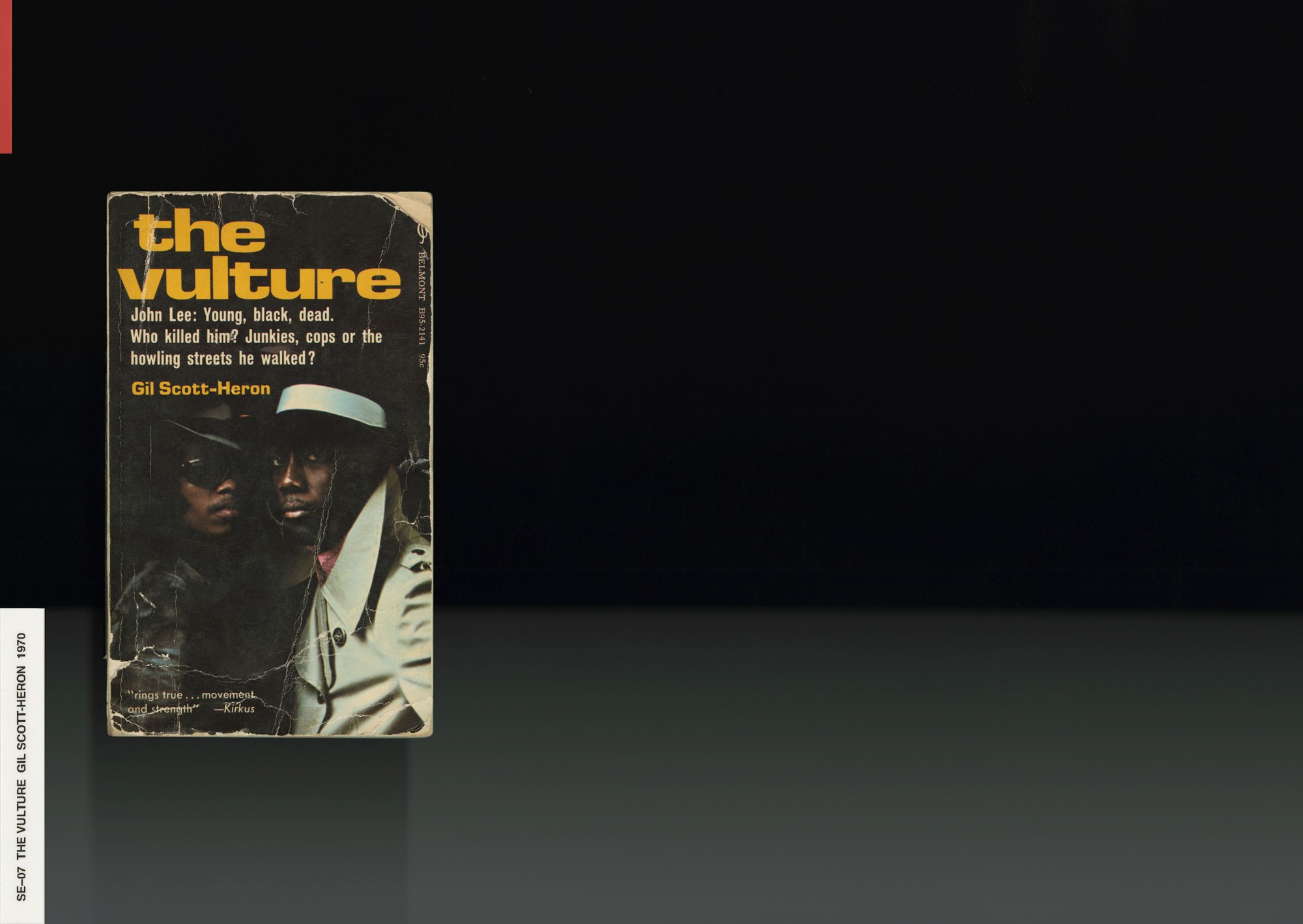
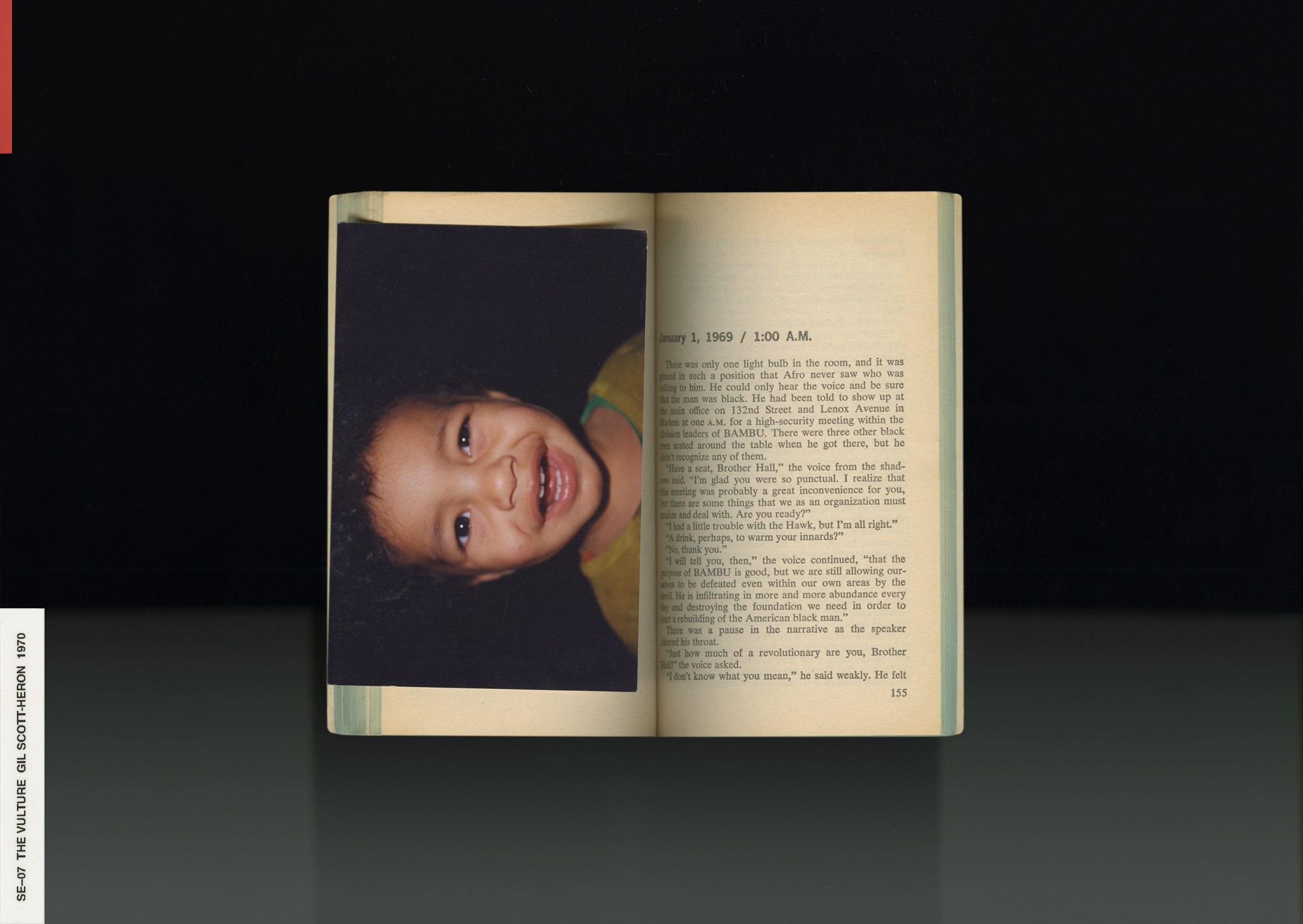
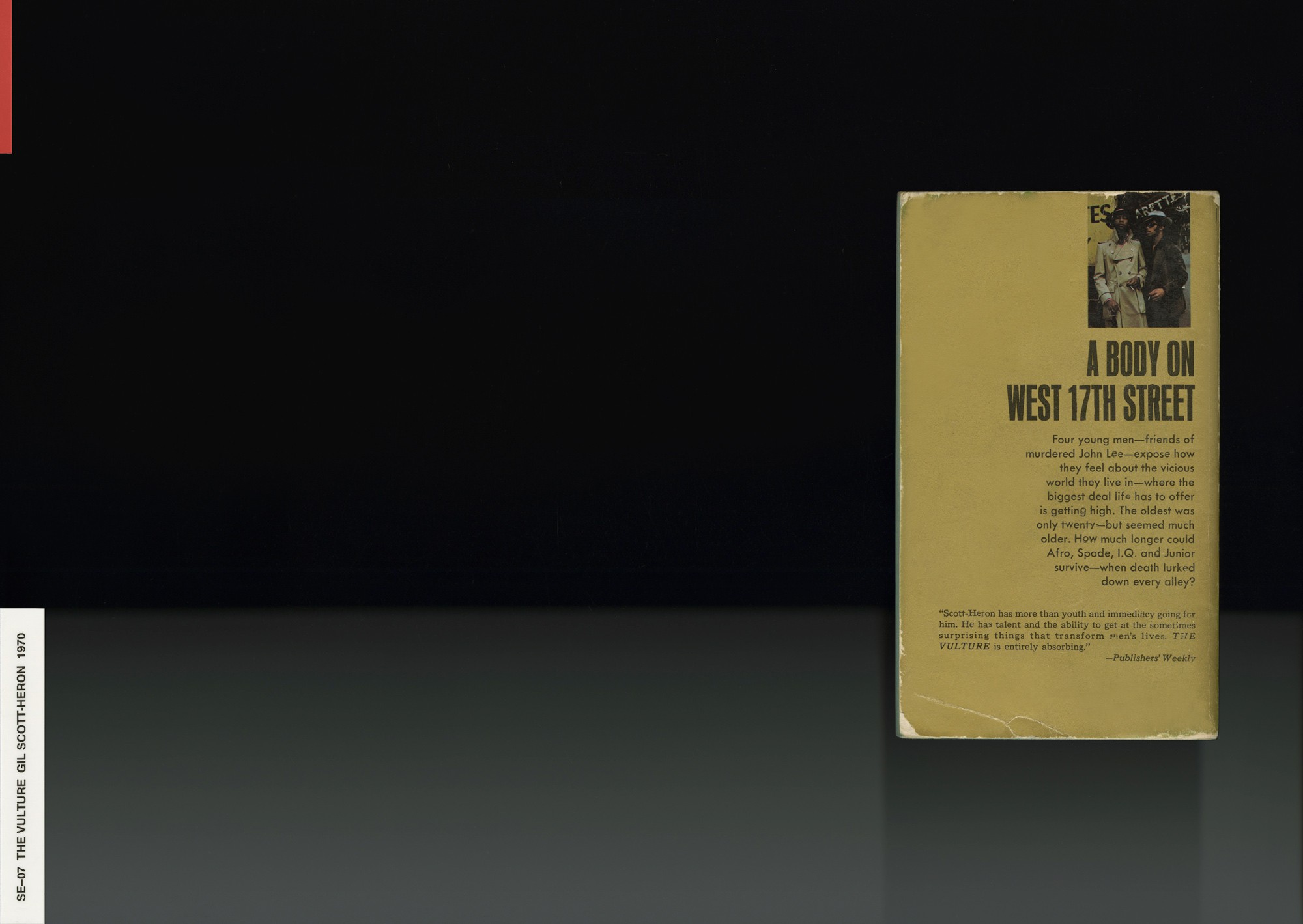
NR
Looking at your library, would there be an obsession revealed through looking at all the books?
SE
Not necessarily obsessive, but it's a lot on black history16. I wasn't taught in school much about black history, so I'm grateful that I had parents and grandparents that taught me indigenous history17, black history. There were only about 20 books on black history at the elementary school I went to. That one area of the library was my zone. So I just read everything in there; , , , . My mother had then introduced me to the poetry of and . I used to love the Book Fairs at school. Remember those? I loved the sports books. There was this one about that I absolutely loved.
And mental health. Not specifically like, you know, mental health 101, but books about self. Not in a selfish way. Not in an egotistical way. But ways of learning about yourself through other peoples experiences. Whether it's non-fiction or not.
NR
Are there any recent experiences you've had that really taught you about your own self?
SE
Yeah, absolutely. Getting sober. I thought that there was a bigger problem at hand and I was like, what is it? You know, and it was as simple as just getting those substances out of my life that were not allowing me to operate or use the part of my brain that I was shutting down. Which is your . Just the ability to be compassionate and reasonable and present. I'm still working at it. I'm still not perfect at all, far from it.
My sister has this analogy about getting sober; it's like, prior to getting sober you're in a room, a smoky room, like a misty room. You can't really see what's in front of you. And getting sober is like the smoke clears and there's just a steaming pile shit of in the room. And you're like, oh my god, this whole time you’ve wondered where you are for it to just reveal that it's just a pile of shit. And now though, that the smoke is cleared, you're left with, okay, what do I do next? I can clean this shit, or I can live amongst it, or I can move around it. Getting sober doesn't mean that the smoke clears and you're in paradise. You're in a room with a steaming pile of shit. But now, you know it's there. You know what you're working with.
I'm glad that I was able to identify that this was the key source or the main reason that I was unable to live my life in a peaceful way. The peace was fluctuating. It came and went when it pleased. And now peace is quite attainable for me through my daily practices; meditation, being active in my gratitude, how I choose to be grateful, and what I choose to be grateful for. Now I find gratitude in the littlest things, if it's a strawberry or, you know, being able to be outside with my shirt off with my dog and a slice of pizza just feeling the sun. It’s those little things. I wasn't even able to acknowledge those things before…
NR
Looking ahead to the future, back at the time you've been alive, so 1997–2021. Let’s say we’re in 2040. What book would you pass to your children that was written about our time? It doesn't have to be an actual book, moreso a volume representing the most significant event or figure in your lifetime.
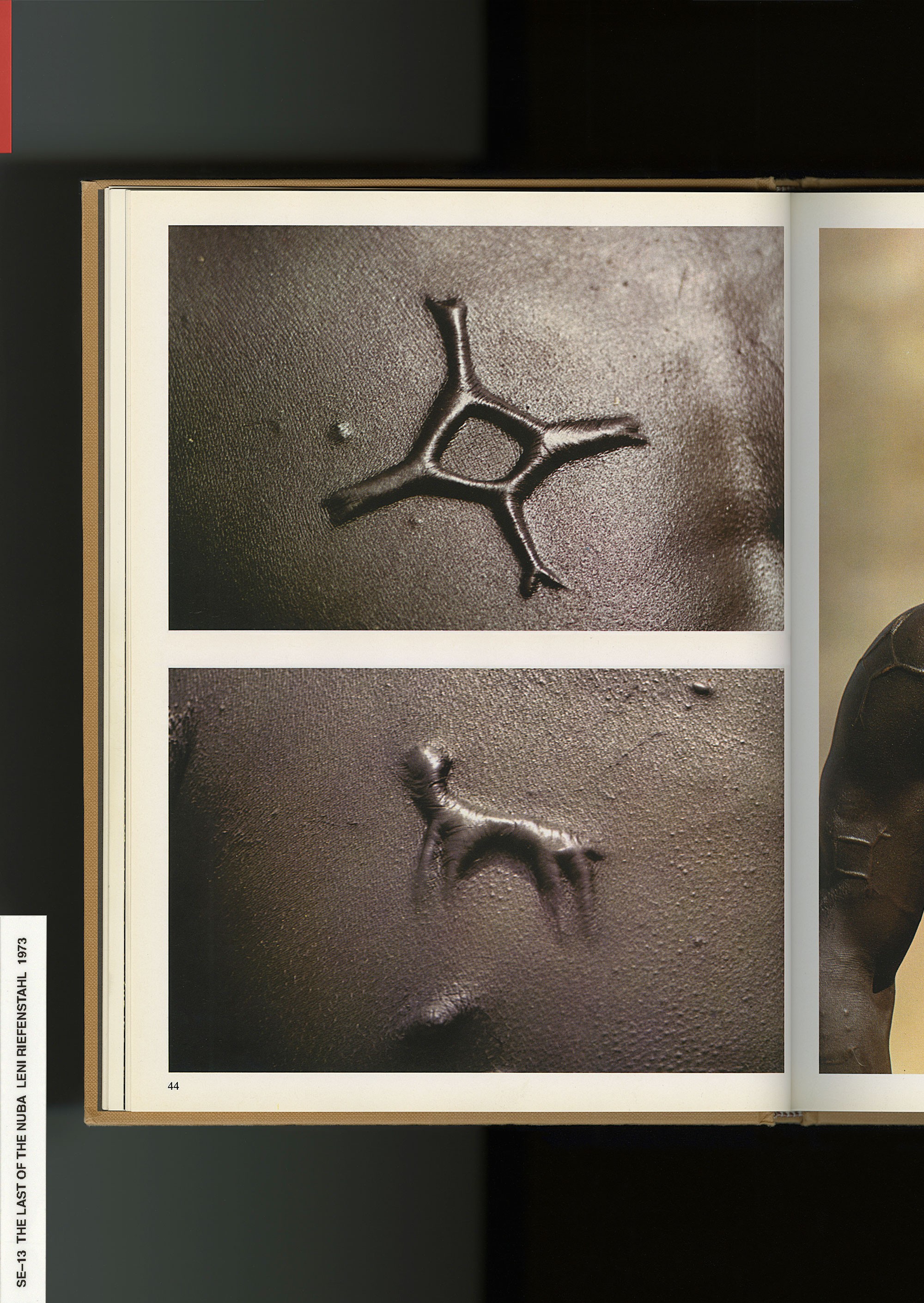
SE
It’s very out there––I guess, being born, you know what I mean? From the perspective of biological creation. Just about existence, and how we come to be. And how, experiences differ, you know, it would be almost like a philosophy book. Like, talks about the blank slate, and how we learn through experience. I don't necessarily believe that. I believe that we are spirits that have lived many times before. There is a karmic balance to this thing we call life, we're here to learn what we didn't learn, or what we weren't able to learn before. You know, maybe we did learn it, but the answer wasn't revealed to us. So you get another go, another go, and another go if you don't figure it out.
I find myself judging myself and even people that I've spoken to in the past that are like, I don't want to come back again. Because I feel like that is directly why you're going to be coming back again. This life is tiring you know? But, that’s part of it.
NR
Do you have any sense of a past life that exists within you?
SE
Not quite. I did have a dream when I was a kid from the first person. It's the first time that I was very present in a dream. I was like, oh, it's me Sage, but I had come into a dream state and was like, oh shit, whoa, where am I? I remember looking at my hands. They were just like, really ancient looking hands, just wild, wildly shaped. And they were darker than my hands are now. But like a different kind of color, more olive-y, you know, more indigenous looking. And I went into a teepee, a big teepee, where I peeled back the hide to enter, and it was an elderly woman in there sitting at a fire. She told me to come and I sat down across from her and she went behind her and handed me a loaf of bread.
NR
Closing the loop, what were the formative texts read to you as a child, and how did they define your way of thinking?
SE
My grandfather introduced me to literature. The first book he gave me was the Autobiography of Frederick Douglass18. Being that was mixed race, my grandfather always instilled in me that I was to take pride in my heritage and my history. My grandfather made me acknowledge that I was light skinned, and he would always remind me of his struggles as a black man, and explained to me that it was my duty to be proud of my blackness.
My grandfather loved me, and was interested in me, and he was interested in my growth. He taught me how to empathize, and really, allowed that book to mediate. There was a driving force he saw within me. My interest in learning about who I was.
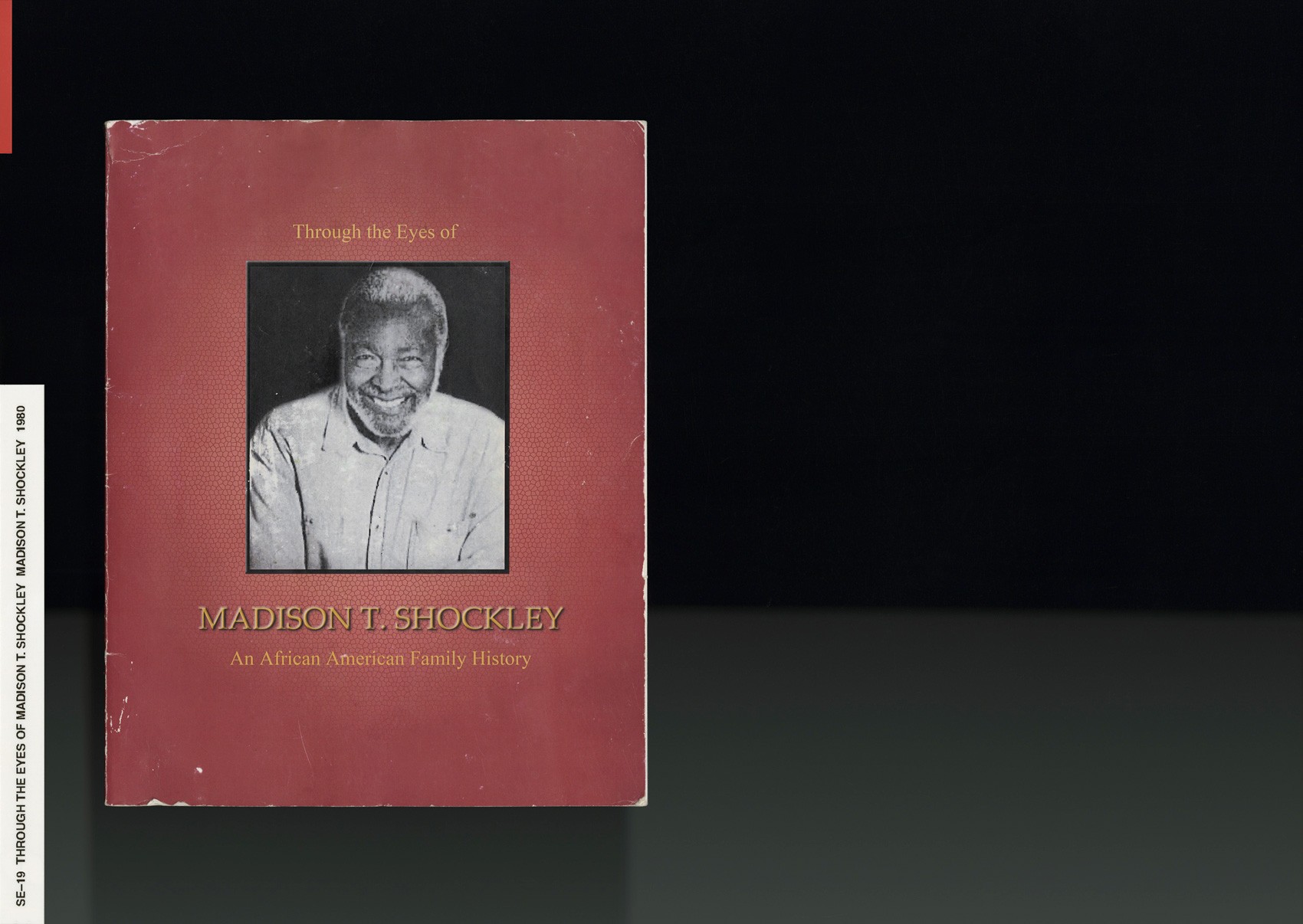
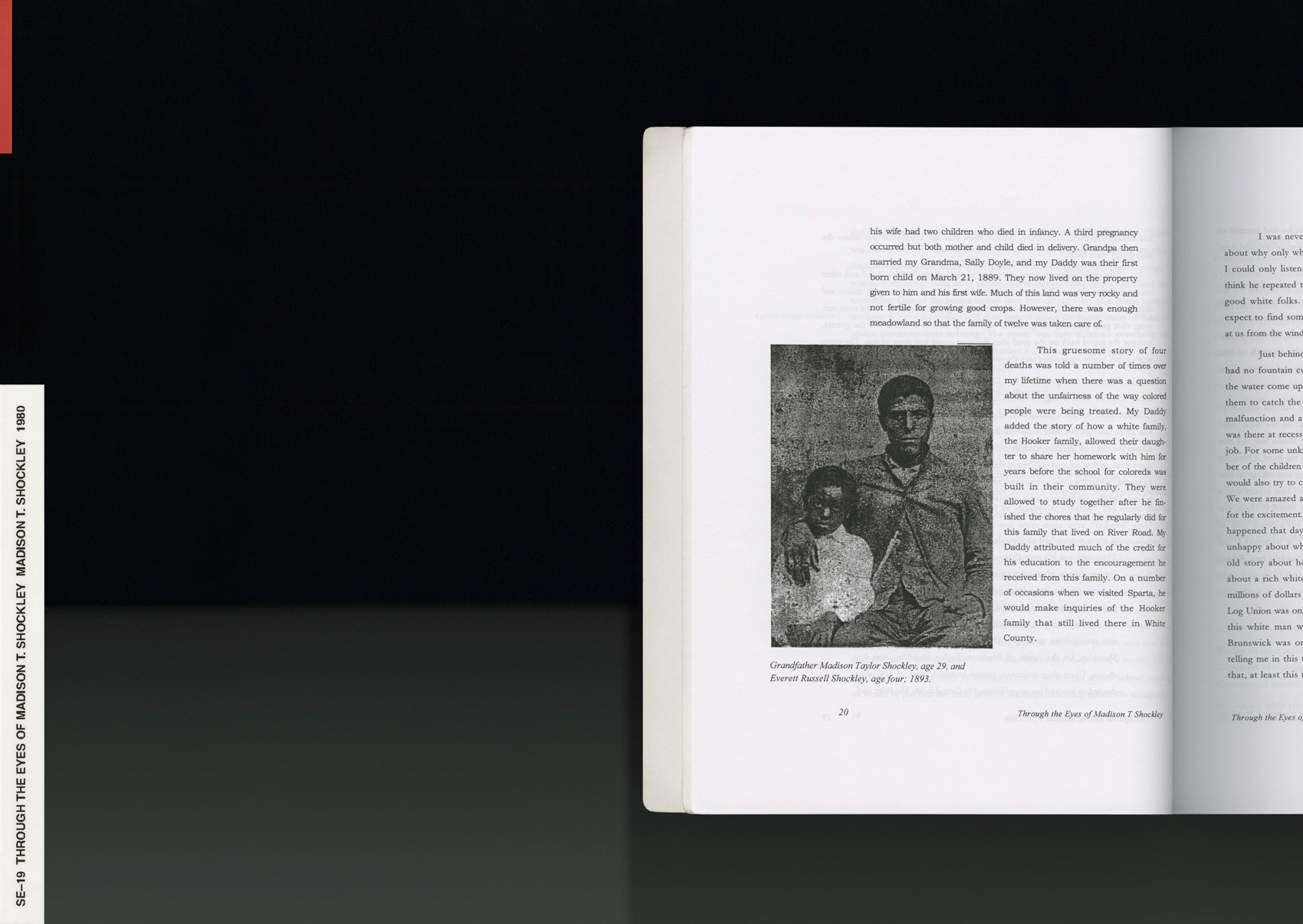
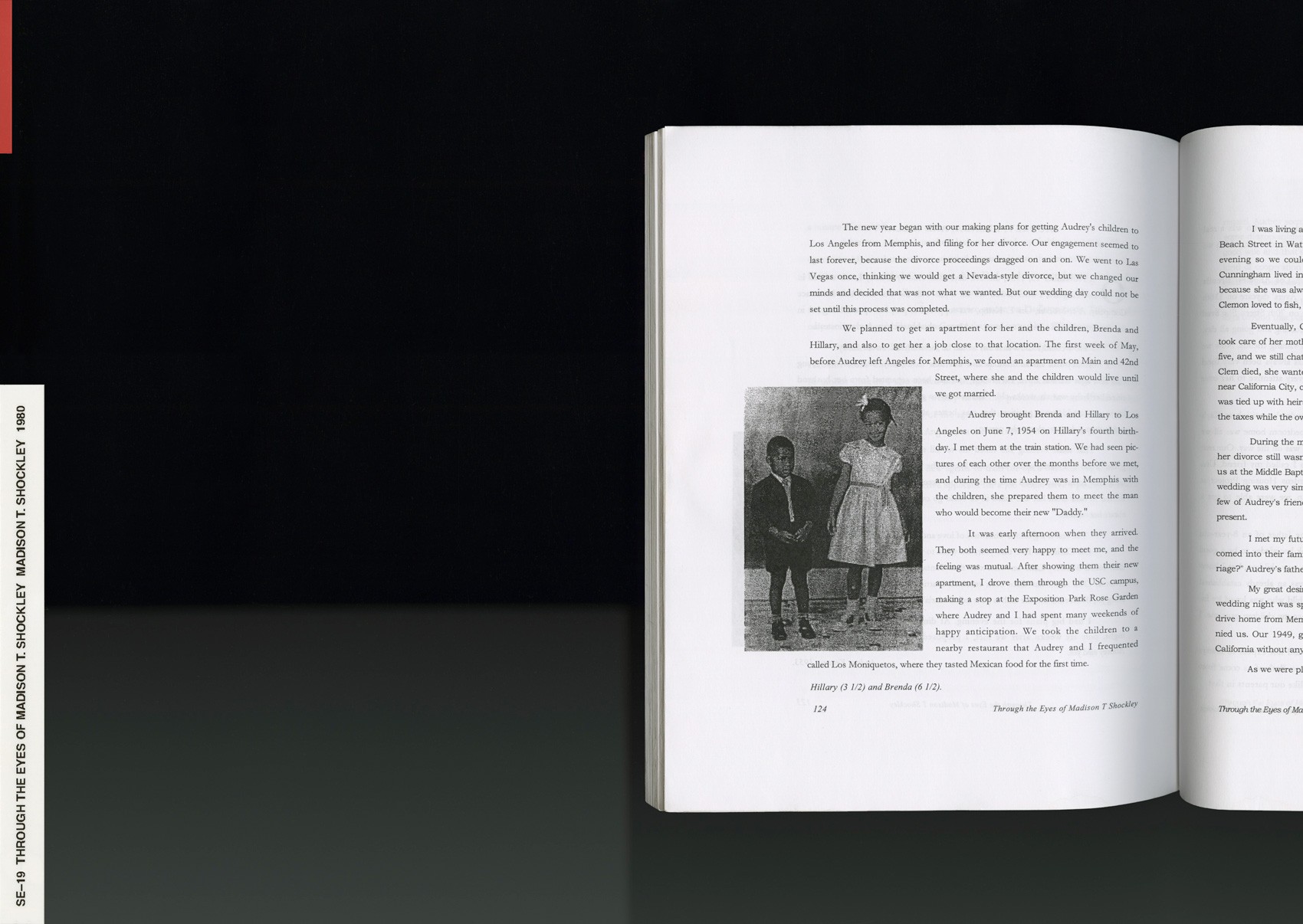
NR
On page 64 of your grandfather's autobiography19 he wrote;
A number of male students were dropping out of school because they expected to be drafted. Educational deferments were not available to everyone. Meanwhile, America rushed to convert manufacturing plants to produce war items. Some auto plants began to produce jeeps and tanks for the battlefields of Europe.
The questions asked of me, while we sat on that little isle in the middle of that river, helped me put into words what had been in my heart.
My answer to the question of whether I was going into the service was, “I cant go. Whatever the consequence, I'll have to face it when it comes. I don't know what will happen to me. I don't know anyone who has faced this situation before."
SE
My grandfather was amongst the first group of Conscientious . In his autobiography he talks about when he learned what a Conscientious objector was. And at that time WWII was in full effect. So, imagine being drafted as a black man. That was a death wish, damn near. And they put them in a because he had said, "No" to going to war. I think that really molded him. To go through all of that and still be loving, that was a testament of peace.
I'm still working on that because of the current state of things and last year––it's had me tight. But learning to just be accepting and understanding, I can maneuver through all of this with love and compassion without being in over my head...
Him being a Conscientious objector, regardless if I agree––I don't think that I'm a pacifist––I try to actively engage in non-violence, but I do believe that, you know, protecting yourself is protecting yourself. And I think he would agree. If someone's trying to attack your family you have to be able to protect yourself. You should be able to protect yourself. There's even an interview where my grandfather says, “If I was of a military mind, I would have been a Black Panther. Fighting for the rights of the minority, right where we live.”
My grandfather addresses that in his autobiography also, how his father told him not all white folks are bad. It's contradictory, because there's a Muhammad Ali interview with Dick Cavett and he said something like, if there's 10,000 snakes coming down a mountain to attack me and you tell me 2,000 of those snakes are good snakes, do I trust that 2,000 of those snakes are going to build a wall around me and protect me from the other 8,000?
Or do I just close the door on all of them and stay safe?
